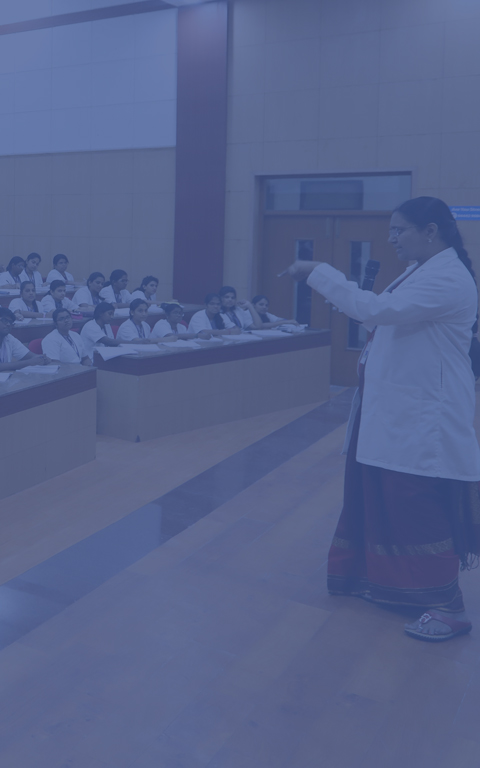The MBBS (Bachelor of Medicine/Bachelor of Surgery) course represents the foundation of medical education in India and it is the first (undergraduate) level of training required to be licensed as a physician. MBBS is a professional degree in medical sciences and a candidate with an MBBS degree is certified to be a medical practitioner in India.
The course duration is five and a half years including four and a half years of training in various medical specialties and one year of compulsory rotational internship at the hospital and health centres.
The MBBS curriculum is competency-based and has been designed to produce an Indian Medical Graduate possessing the necessary knowledge, skills, attitude and values; enabling them to function as the physician of the first line of contact for patients seeking medical aid.
The MBBS course training imparted is as follows:
-
First Professional MBBS comprises a 1 Month Foundation course to facilitate the student to adapt to the rigorous schedule of the medical program, followed by 13 months of study in pre-clinical specialties – Human Anatomy, Physiology & Biochemistry. In addition, a brief introduction to Community Medicine, Humanities and Attitude, Ethics and Communication Module (AETCOM) is given and Early Clinical Exposure is also facilitated.
-
Second Professional MBBS spans 12 months and involves knowledge acquisition in para clinical specialties such as Pathology, Microbiology, Pharmacology, Forensic Medicine and Toxicology. The medical undergraduate also has clinical postings, Community Medicine and AETCOM.
-
Third Professional Part 1 comprises 13 months of study during which the students are further oriented clinically through postings in General Medicine, General Surgery, OBG, Paediatrics, Orthopaedics, Dermatology, Psychiatry, Otorhinolaryngology, Ophthalmology, Community Medicine, Forensic Medicine and Toxicology, Respiratory Medicine, Radio diagnosis & Radiotherapy, Anaesthesiology.
-
This is followed by 2 months of postings in any department of the student’s choice (Elective postings).
-
Third Professional Part 2 includes 13 months of intense training in General Medicine, Paediatrics, General Surgery, Orthopaedics, Obstetrics and Gynaecology.
-
This curriculum which is prescribed by the Medical Council of India (MCI) is such that MBBS degree holders can choose a specialization for further majoring and/or practice medicine.
The curriculum for the medical programs has been designed as per the recommendations of the concerned statutory bodies. The relevance of the programs to the individual and the society at large is highlighted by the facts that they offer 100% employability
Click here for MBBS Regulations & Syllabus
For further details on CBME, please refer to the MCI website:
https://www.mciindia.org/CMS/information-desk/for-colleges/ug-curriculum
Eligibility for admission to M.B.B.S. degree course:
Qualifying examination: Admissions to all seats of MBBS/BDS will be done through NEET (UG)
-
Aspirants must be aware that admission to deemed universities is based on the NEET scores and the rank obtained by the candidate. No separate Entrance Examination is conducted by the deemed universities.
-
Admission is determined through the central counselling process conducted by Directorate General of Health Services (DGHS) on behalf of Medical Counselling Committee (MCC).
-
Candidates should have qualified in the National Eligibility-cum-Entrance Test conducted by the National Testing Agency, New Candidates should have obtained the minimum percentage of marks in the qualifying examination as per Medical Council of India norms. All admissions to MBBS degree course within the respective categories will be based solely on the marks obtained in the National Eligibility cum Entrance Test(NEET).For all other eligibility conditions, the official website of the Medical Council of India may be referred.
- – ntaneet.nic.in
Age limit: Eligibility for appearing in NEET (UG) is as stipulated in Indian Medical Council Act-1956 as amended in 2018. Eligibility as per regulations is as follows: –
-
He/she has completed age of 17 years at the time of admission or will complete that age on or before 31st December of the year of his/her admission to the 1st year MBBS/BDS Course.
-
The upper age limit for NEET (UG) is 25 years as on the date of examination with relaxation of 5 years for the candidates belonging to SC/ST/OBC category and persons entitled for reservation under the Rights of Persons with Disabilities Act, 2016.
-
Indian Citizens/ Overseas Citizens of India intending to pursue MBBS/ BDS from a foreign Medical/ Dental Institute also need to qualify NEET (UG).
Student Selection:
The selection of students to MBBS course shall be based solely on merit list of the candidates in the National Eligibility cum Entrance Test as drawn by the admitting/counseling authorities in the respective categories.
Anatomy is a branch of medicine that deals with the structure of the human body.
MD (Doctor of Medicine) in Anatomy is a postgraduation course which involves a detailed study of subjects such as Gross and Regional Anatomy, Osteology, Anthropology, Myology, Systemic Anatomy, Neuroanatomy, Applied and Clinical Anatomy, General & Systemic Embryology, Comparative Embryology, Principles of Genetics, General Histology, Histology of Organs & Structure, Staining Techniques, Outline of Evolution, Comparative Anatomy, Physical Anthropology, Radiological Anatomy, Surface Anatomy, Surface marking of Human Body.
The course duration is 3 years.
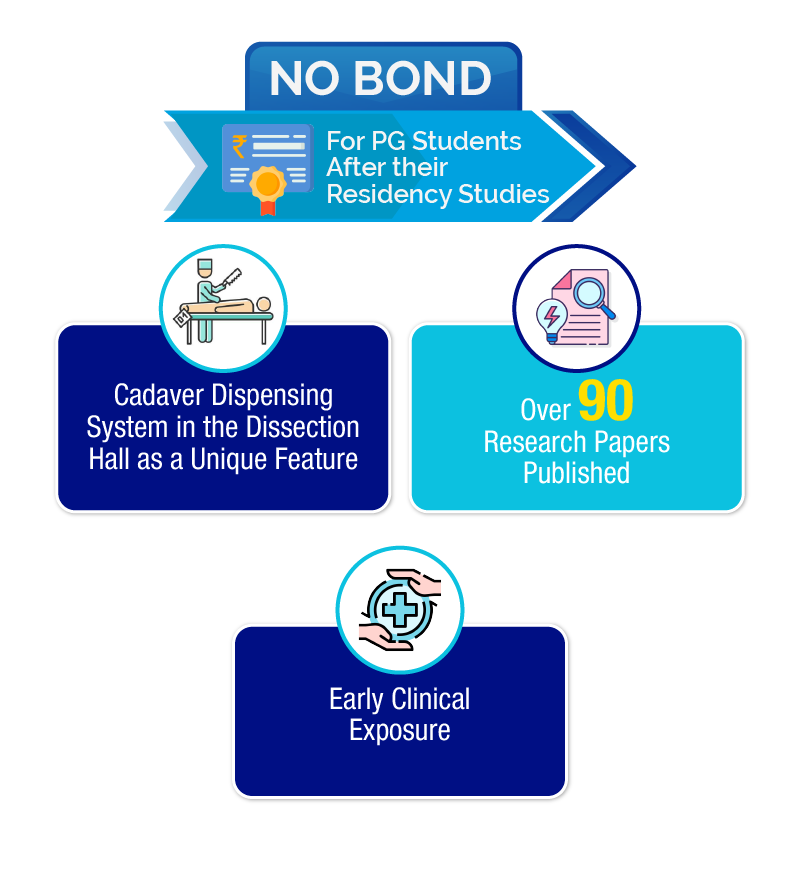
After obtaining the MD Anatomy degree, the candidate can apply for placement as a teaching faculty in a government or private medical college in India or abroad. He/ She can also pursue a PhD in Anatomy, if inclined towards research.
Goals
The goal of the MD Anatomy course is to train the MBBS graduates to become competent teachers of the subject and to conduct ethical research in Anatomy.
Objectives
By the end of the course, the postgraduate should
- Have acquired the competencies pertaining to the subject of Anatomy that are required to be practiced at all levels of health system.
- Be aware of the recent advances and developments in the field of Anatomy
- Participate in National Health Education Program and carry out their responsibilities
- Be oriented to the Principles of research methodology.
- Has acquired skills in educating medical and paramedical professionals.
- Has acquired effective communication skills
- Acquire skills of integrating anatomy with other disciplines as and when needed.
- Has acquired qualities of a good teacher capable of innovations in teaching methodology.
- Has been able to demonstrate adequate management skills to function as an effective team leader
Click here for M.D Anatomy Syllabus & Regulations
-
All candidates seeking admission to Post Graduate Medical & Surgical Degree courses in Chettinad Hospital and Research Institute under Chettinad Academy of Research and Education for the current academic year will have to qualify in the National Eligibility cum Entrance Test for Postgraduates, (NEET-PG) for the respective year conducted by the National Board of Examinations which is mandatory. It shall be necessary for the candidate to obtain minimum of marks at 50th percentile in ‘NEET-PG’. (However, in respect of candidates belonging to Scheduled Castes, Scheduled Tribes and other Backward Classes the minimum marks shall be at 40th percentile. The minimum qualifying mark in case of candidates with loco motor disability of lower limbs shall be at 45th percentile.)
-
As Chettinad Hospital and Research Institute is a constituent college under Chettinad Academy of Research and Education, a Deemed to be University under Section 3 of the UGC Act 1956, admissions are made on All India basis and therefore candidates belonging to any State/Union Territory of India are eligible to apply for admission. There is no restriction based on domicile.
-
The candidates must have satisfactorily completed one-year compulsory rotatory residential internship (CRRI) on or before 31st March the previous year. Candidates who have completed their internship after 31st March of the previous year shall be ineligible to participate at any stage of the admission process.
-
The candidate must have studied and completed the MBBS degree course from a recognized Medical College included in the schedules to the Indian Medical Council Act 1956, and should have obtained permanent Registration Certificate with the Medical Council of India or any of the State Medical Councils.
-
In case of a foreign national, the Medical Council of India may, on payment of the prescribed fee for registration, grant temporary registration, for the duration of the post graduate course limited to the medical college/institution to which the candidate is admitted for the time being exclusively for pursuing post graduate studies.
-
Provided further the temporary registration to such foreign national shall be subject to the condition that such person is duly registered with appropriate registering authority in his own country where from he has obtained his basic medical qualification and is duly recognized by the corresponding Medical Council or concerned authority.
MD (Doctor of Medicine) Physiology is a medical postgraduate course which involves an in-depth study of the normal functioning of the human body comprising of various organ systems. This forms the basis for understanding the abnormal function seen in human disease and for envisaging novel methods of treatment, through translational research.
The course duration is 3 years.
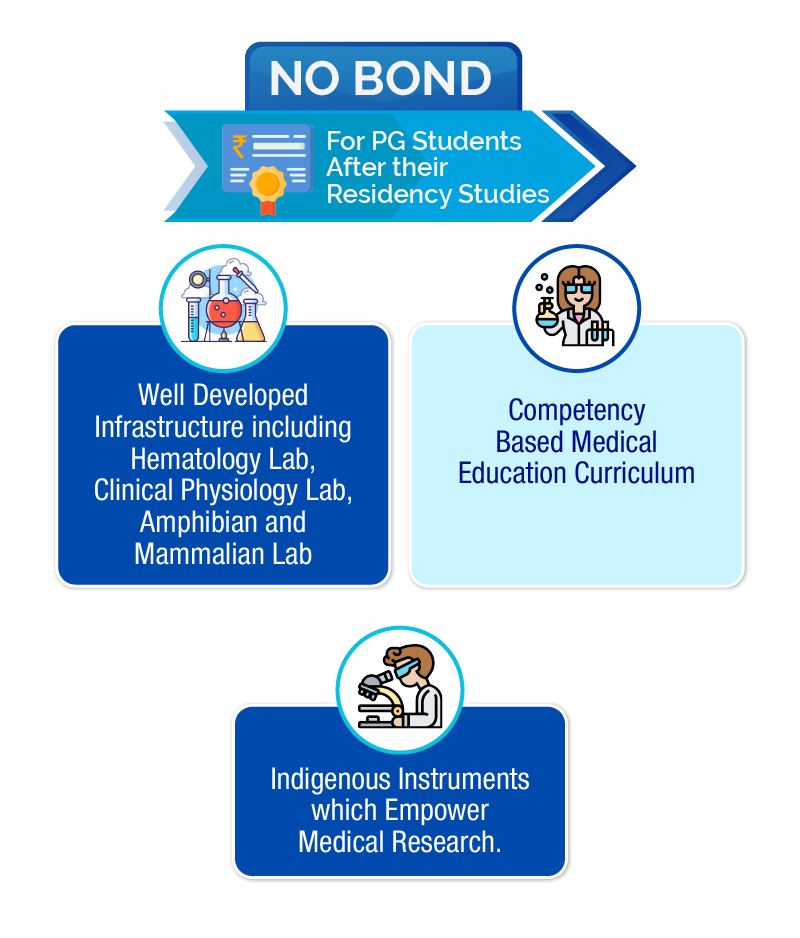
Candidates after successfully obtaining the MD Physiology degree can be recruited as faculty in government or private medical colleges. Those interested in research can pursue their Ph.D. in the same field of specialization.
Goals
The goal of the MD Physiology course is to train the MBBS graduates to become competent teachers of the subject and to conduct ethical research in the field of Physiology. This course will ensure the availability of competent physiologists equipped with the required skills for teaching and applied research.
Objectives
A post-graduate student having qualified the MD (Physiology) examination should be able to:
-
Understand and deal with all aspects of general, systemic and Applied Physiology.
-
Teach effectively the basic physiological mechanisms of the human body with reference to their implications in the pathogenesis of diseases (pathophysiology) affecting various organ systems and the physiological basis of their management to undergraduate medical, paramedical and all other basic science students
-
Understand the general principles of medical education
-
Effective use of physiology knowledge to solve diagnostic and therapeutic problems.
-
Interpret and evaluate research publications critically.
-
Use the library facilities (Literature database using a computer, CD ROM, internet search and any other available newer techniques).
- Explore the possibility of e-learning
-
Conduct relevant clinical/experimental research that may have a significant bearing on human health and patient care and interpret the research findings in light of its basic and applied significance.
-
Acquire skills in conducting collaborative research in the field of physiology with allied sciences, clinical sciences and biomedical engineering.
-
Interact with the allied departments and render services in advanced laboratory investigations.
-
Acquire administrative skills to set up concerned department/laboratories and initiate purchase procedure and procure necessary items for running such laboratories.
- Team building skills
Click here for M.D Physiology Syllabus & Regulations
-
All candidates seeking admission to Post Graduate Medical & Surgical Degree courses in Chettinad Hospital and Research Institute under Chettinad Academy of Research and Education for the current academic year will have to qualify in the National Eligibility cum Entrance Test for Postgraduates, (NEET-PG) for the respective year conducted by the National Board of Examinations which is mandatory. It shall be necessary for the candidate to obtain minimum of marks at 50th percentile in ‘NEET-PG’. (However, in respect of candidates belonging to Scheduled Castes, Scheduled Tribes and other Backward Classes the minimum marks shall be at 40th percentile. The minimum qualifying mark in case of candidates with loco motor disability of lower limbs shall be at 45th percentile.)
-
As Chettinad Hospital and Research Institute is a constituent college under Chettinad Academy of Research and Education, a Deemed to be University under Section 3 of the UGC Act 1956, admissions are made on All India basis and therefore candidates belonging to any State/Union Territory of India are eligible to apply for admission. There is no restriction based on domicile.
-
The candidates must have satisfactorily completed one-year compulsory rotatory residential internship (CRRI) on or before 31st March the previous year. Candidates who have completed their internship after 31st March of the previous year shall be ineligible to participate at any stage of the admission process.
-
The candidate must have studied and completed the MBBS degree course from a recognized Medical College included in the schedules to the Indian Medical Council Act 1956, and should have obtained permanent Registration Certificate with the Medical Council of India or any of the State Medical Councils.
-
In case of a foreign national, the Medical Council of India may, on payment of the prescribed fee for registration, grant temporary registration, for the duration of the post graduate course limited to the medical college/institution to which the candidate is admitted for the time being exclusively for pursuing post graduate studies.
-
Provided further the temporary registration to such foreign national shall be subject to the condition that such person is duly registered with appropriate registering authority in his own country where from he has obtained his basic medical qualification and is duly recognized by the corresponding Medical Council or concerned authority.
[metaslider id=”15885″]
MD (Doctor of Medicine) in Microbiology is a medical postgraduate course which involves the in-depth study of microorganisms causing various infectious diseases- the cause, development and the diagnostic and preventive aspects. During this course, the theoretical and practical knowledge is imparted in various subspecialties such as Bacteriology including Mycobacteriology and Anaerobic bacteriology, Virology, Parasitology, Immunology and Mycology. They are also trained in hospital infection control practices and in the basics of translational research.
The course duration is 3 years.
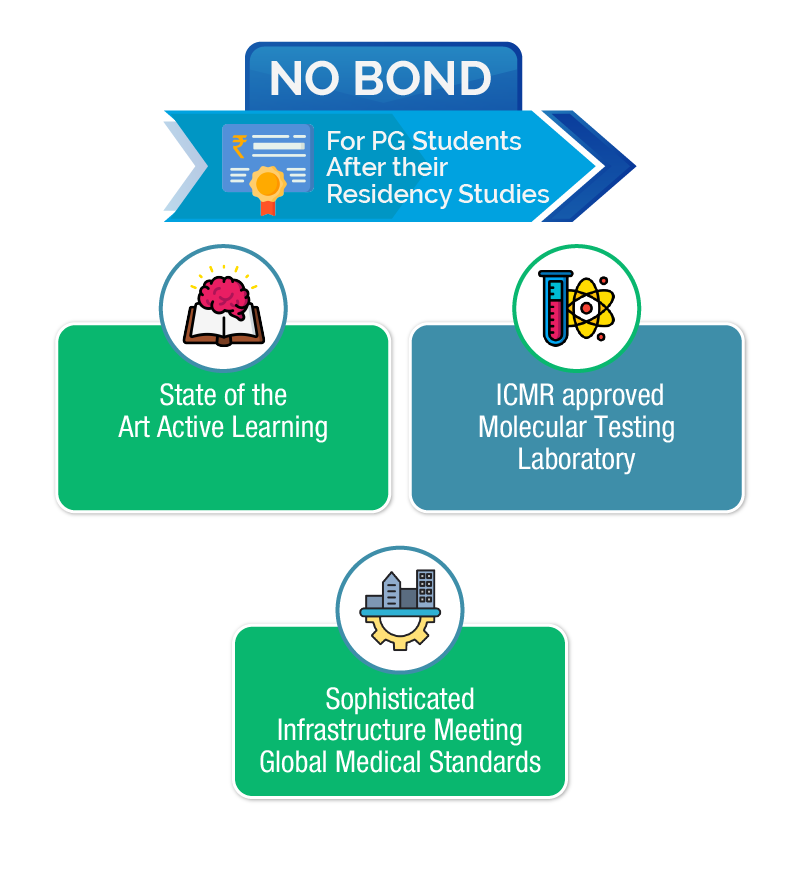
Candidates after successfully obtaining the MD Microbiology degree can be recruited as faculty in government or private medical colleges. They can also get placements as a Full time or a part time consultant in Clinical Laboratories or research labs. They can also get appointed as NABL Assessors after undergoing required training. Those interested in research can pursue their PhD in the same field of specialization. They can also establish their own laboratory.
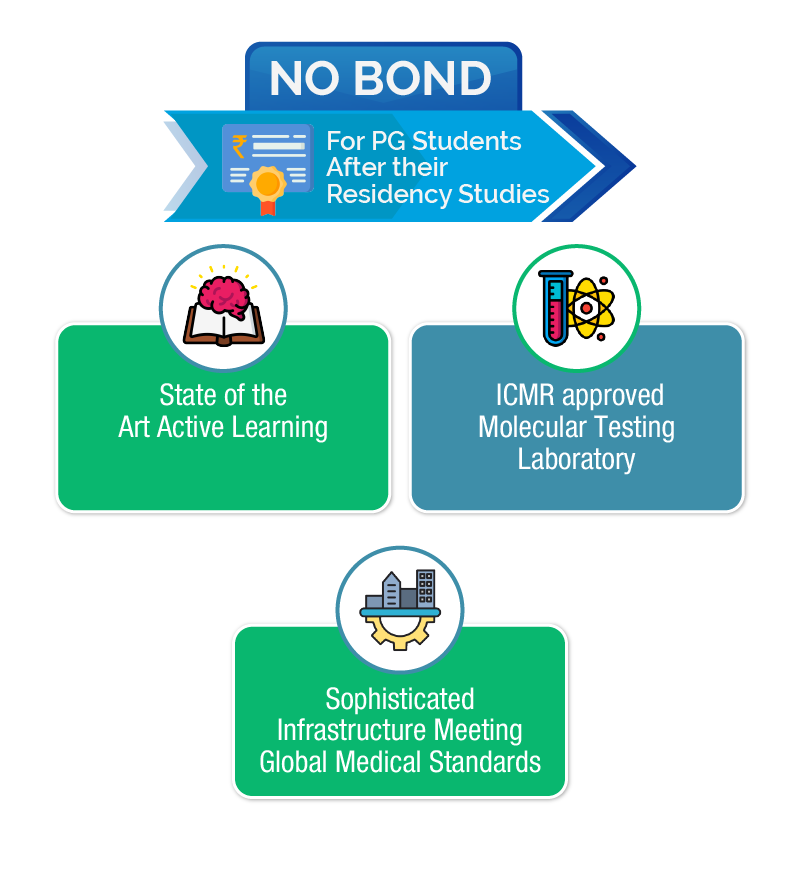
Goals
The MD Microbiology course trains medical graduates in the field of Medical Microbiology comprising of various subspecialties such as Bacteriology including Mycobacteriology and Anaerobic Bacteriology, Virology, Parasitology, Immunology and Mycology empowering them to participate in good patient care and prevention of infectious diseases in the community. They are introduced to basic research methodology so that they can conduct fundamental and applied research. They are also trained in the various teaching learning methods.
Objectives
At the end of the MD program in Microbiology, the post graduate student should have acquired competencies in the following areas, and be able to
- Interact effectively with the allied departments by rendering services in basic as well as advanced laboratory investigations
- Demonstrate application of microbiology in a variety of clinical settings to solve diagnostic and therapeutic problems along with preventive measures.
- Play a pivotal role in hospital infection control, including formulation of antibiotic policy and management of biomedical waste.
- Acquire skills in conducting collaborative research in the field of Microbiology and allied sciences and conduct such clinical/experimental
research as would have significant bearing on human health and patient care - Demonstrate effective communication skills required for the practice of clinical microbiology and while teaching undergraduate students
- Establish good clinical microbiological services in a hospital and in the community in the fields of bacteriology, virology, parasitology, immunology and mycology.
- Plan, execute and evaluate teaching assignments in Medical Microbiology.
- Plan, execute, analyze and present the research work in medical microbiology.
- To acquire various skills for collaborative research.
- To participate is various workshops/seminars/journal clubs/demonstration in the allied departments
- Other skills include Laboratory and Diagnostic skills in Clinical Microbiology, Teaching Skills, Research Methodology, Communication and attitudinal skills
Click here for M.D Microbiology Syllabus & Regulations
-
All candidates seeking admission to Post Graduate Medical & Surgical Degree courses in Chettinad Hospital and Research Institute under Chettinad Academy of Research and Education for the current academic year will have to qualify in the National Eligibility cum Entrance Test for Postgraduates, (NEET-PG) for the respective year conducted by the National Board of Examinations which is mandatory. It shall be necessary for the candidate to obtain minimum of marks at 50th percentile in ‘NEET-PG’. (However, in respect of candidates belonging to Scheduled Castes, Scheduled Tribes and other Backward Classes the minimum marks shall be at 40th percentile. The minimum qualifying mark in case of candidates with loco motor disability of lower limbs shall be at 45th percentile.)
-
As Chettinad Hospital and Research Institute is a constituent college under Chettinad Academy of Research and Education, a Deemed to be University under Section 3 of the UGC Act 1956, admissions are made on All India basis and therefore candidates belonging to any State/Union Territory of India are eligible to apply for admission. There is no restriction based on domicile.
-
The candidates must have satisfactorily completed one-year compulsory rotatory residential internship (CRRI) on or before 31st March the previous year. Candidates who have completed their internship after 31st March of the previous year shall be ineligible to participate at any stage of the admission process.
-
The candidate must have studied and completed the MBBS degree course from a recognized Medical College included in the schedules to the Indian Medical Council Act 1956, and should have obtained permanent Registration Certificate with the Medical Council of India or any of the State Medical Councils.
-
In case of a foreign national, the Medical Council of India may, on payment of the prescribed fee for registration, grant temporary registration, for the duration of the post graduate course limited to the medical college/institution to which the candidate is admitted for the time being exclusively for pursuing post graduate studies.
-
Provided further the temporary registration to such foreign national shall be subject to the condition that such person is duly registered with appropriate registering authority in his own country where from he has obtained his basic medical qualification and is duly recognized by the corresponding Medical Council or concerned authority.
MD (Doctor of Medicine) in Pharmacology is a medical postgraduate course which involves the detailed study of medications (natural or synthetic substances) and their effect on the human body. Students are trained on the sources, mechanism of action, indications, dosing, side effects, drug interaction, contraindications etc. of these drugs. The course includes knowledge acquisition in the fields of general and systematic pharmacology, experimental and clinical pharmacology, recent advances and the students are also given an overview of the clinical and other basic sciences related to pharmacology, while being concurrently trained in translational research.
The course duration is 3 years.
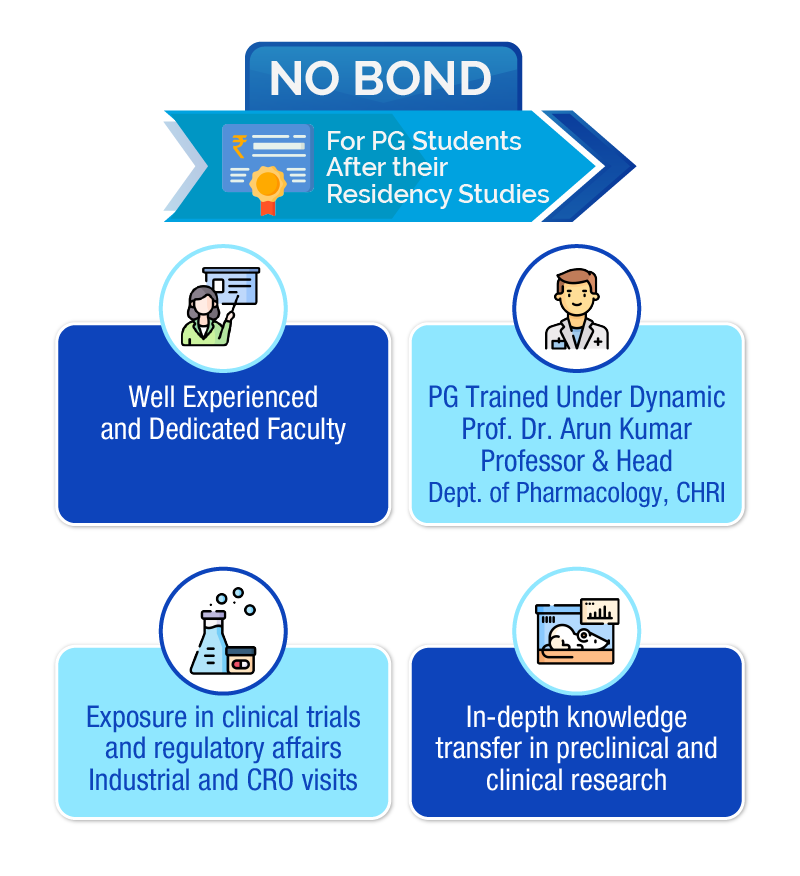
Candidates after successfully obtaining the MD Pharmacology degree can be recruited as faculty in government or private medical colleges. They can also get placements in Clinical Research Labs where drug trials are being conducted or in Drug companies. Those interested in research can pursue their PhD in the same field of specialization. They can also establish their own Clinical Research laboratory.
Goals
The overall goal of the course is to develop expertise in the field of Pharmacology and rational approach to drug development and therapy so that he/she shall be competent to pursue various activities as demanded by the profession as a Pharmacologist and as a doctor.
Objectives
At the end of the course the student should be able to
-
Have a holistic knowledge of the source, chemical structure, actions, mechanisms, adverse effects and pre clinical and clinical evaluation of the various drugs used and drugs to be used in therapy.
-
Be able to explain clearly concepts and principles of Pharmacology and therapeutics. The student should also be able to explain the drug development processes. S/he should be able to explain Drugs and Cosmetics Act, in addition to clinical trial procedures.
-
To practice and promote rational drug therapy with a sound knowledge of drugs.
-
Teach Pharmacology effectively to the students of under graduate & post graduate Medical, Paramedical and other related courses
-
Evaluate the drug effects in animals and humans
-
Carry out research in this area to further the development of new drugs
-
Collect and analyze experimental and clinical data related to drug kinetics or dynamics
-
To use advanced teaching methods
-
To know the regulatory guidelines in drug testing, patent laws and procedures etc.
Click here for M.D Pharmacology Syllabus & Regulations
-
All candidates seeking admission to Post Graduate Medical & Surgical Degree courses in Chettinad Hospital and Research Institute under Chettinad Academy of Research and Education for the current academic year will have to qualify in the National Eligibility cum Entrance Test for Postgraduates, (NEET-PG) for the respective year conducted by the National Board of Examinations which is mandatory. It shall be necessary for the candidate to obtain minimum of marks at 50th percentile in ‘NEET-PG’. (However, in respect of candidates belonging to Scheduled Castes, Scheduled Tribes and other Backward Classes the minimum marks shall be at 40th percentile. The minimum qualifying mark in case of candidates with loco motor disability of lower limbs shall be at 45th percentile.)
-
As Chettinad Hospital and Research Institute is a constituent college under Chettinad Academy of Research and Education, a Deemed to be University under Section 3 of the UGC Act 1956, admissions are made on All India basis and therefore candidates belonging to any State/Union Territory of India are eligible to apply for admission. There is no restriction based on domicile.
-
The candidates must have satisfactorily completed one-year compulsory rotatory residential internship (CRRI) on or before 31st March the previous year. Candidates who have completed their internship after 31st March of the previous year shall be ineligible to participate at any stage of the admission process.
-
The candidate must have studied and completed the MBBS degree course from a recognized Medical College included in the schedules to the Indian Medical Council Act 1956, and should have obtained permanent Registration Certificate with the Medical Council of India or any of the State Medical Councils.
-
In case of a foreign national, the Medical Council of India may, on payment of the prescribed fee for registration, grant temporary registration, for the duration of the post graduate course limited to the medical college/institution to which the candidate is admitted for the time being exclusively for pursuing post graduate studies.
-
Provided further the temporary registration to such foreign national shall be subject to the condition that such person is duly registered with appropriate registering authority in his own country where from he has obtained his basic medical qualification and is duly recognized by the corresponding Medical Council or concerned authority.
MD (Doctor of Medicine) in Pathology is a medical postgraduate course which involves the study of disease- the cause, development and the diagnostic aspects. This branch of medicine acts as a bridge between the basic and clinical sciences. MD Pathology course enables the students to gain competence in diagnosing important disease conditions in the divisions of histopathology, cytopathology, genetics, hematology, and immunopathology. They are also trained in translational research.
The course duration is 3 years.
Candidates after successfully obtaining the MD Pathology degree can be recruited as faculty in government or private medical colleges. They can also get placements as a Full time or a part time consultant in Clinical Laboratories or research labs. They can also get appointed as NABL Assessors after undergoing required training. Those interested in research can pursue their PhD in the same field of specialization. They can also establish their own laboratory.
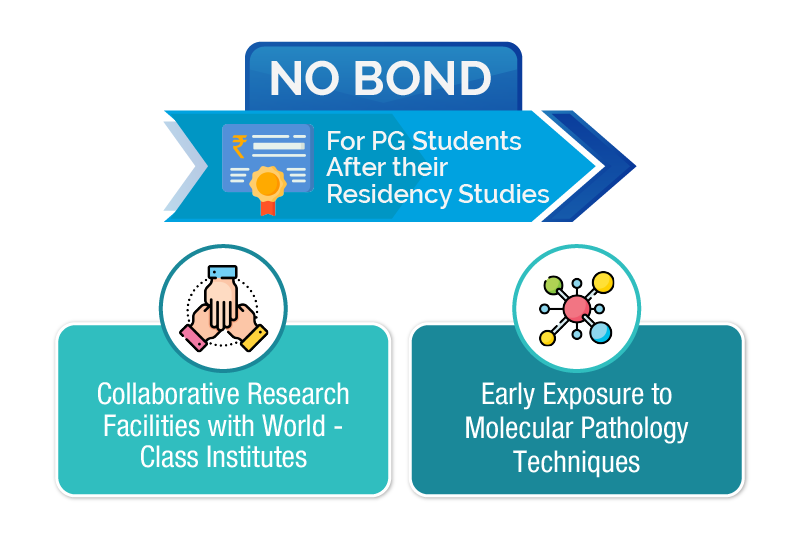
Goals
Goal of the MD Pathology program is to produce a graduate with interpretive skills of the patient results and simultaneously competent teachers in the subject, while also involving in translational research. This course equips the students to perform high-quality diagnoses using appropriate and relevant patient samples and suggest treatment options based on the diagnosis.
Objectives
At the end of the MD program in Pathology, the post graduate student should have acquired competencies in the following areas, and be able to:
-
Diagnose routine and complex clinical problems on the basis of histopathology (Surgical pathology) and cytopathology specimens, blood and bone marrow examination and various tests of Laboratory Medicine (clinical pathology, clinical biochemistry) as well as Blood Banking (Transfusion Medicine).
- Interpretation and correlation of clinical and Laboratory data
- Advise on the appropriate specimens and tests necessary to arrive at a diagnosis in a problematic case.
-
Correlate clinical and laboratory findings with pathology findings at autopsy, identify miscorrelations and the causes of death due to diseases (apart from purely metabolic causes).
- Should be able to teach Pathology to undergraduates, postgraduates, nurses and paramedical staff including laboratory personnel.
- Plan, execute, analyse and present research work.
- Identify problems in the laboratory, offer solutions thereof and maintain a high order of quality control.
- Capable of safe and effective disposal of laboratory waste.
- Able to supervise and work with subordinates and colleagues in a laboratory.
- Always adopt ethical principles and maintain proper etiquette in dealings with patients, relatives and other health personnel
-
Develop communication skills to word reports and professional opinion as well as to interact with patients, relatives, peers and paramedical staff, and for effective teaching.
- Able to perform routine tests in a Pathology Laboratory including grossing of specimens, processing, cutting of paraffin and frozen sections, making smears, and staining.
-
Able to collect appropriate specimens by routinely performing non-invasive out-patient procedures such as venipuncture, finger-prick, fine needle aspiration of superficial lumps and bone-marrow aspirates, and provide appropriate help to colleagues performing an invasive procedure such as a biopsy or an imaging guided biopsy.
- Perform an autopsy, dissect various organ complexes and display the gross findings.
- Should be familiar with the function, handling and routine care of equipment in the laboratory.
Click here for M.D Pathology Syllabus & Regulations
-
All candidates seeking admission to Post Graduate Medical & Surgical Degree courses in Chettinad Hospital and Research Institute under Chettinad Academy of Research and Education for the current academic year will have to qualify in the National Eligibility cum Entrance Test for Postgraduates, (NEET-PG) for the respective year conducted by the National Board of Examinations which is mandatory. It shall be necessary for the candidate to obtain minimum of marks at 50th percentile in ‘NEET-PG’. (However, in respect of candidates belonging to Scheduled Castes, Scheduled Tribes and other Backward Classes the minimum marks shall be at 40th percentile. The minimum qualifying mark in case of candidates with loco motor disability of lower limbs shall be at 45th percentile.)
-
As Chettinad Hospital and Research Institute is a constituent college under Chettinad Academy of Research and Education, a Deemed to be University under Section 3 of the UGC Act 1956, admissions are made on All India basis and therefore candidates belonging to any State/Union Territory of India are eligible to apply for admission. There is no restriction based on domicile.
-
The candidates must have satisfactorily completed one-year compulsory rotatory residential internship (CRRI) on or before 31st March the previous year. Candidates who have completed their internship after 31st March of the previous year shall be ineligible to participate at any stage of the admission process.
-
The candidate must have studied and completed the MBBS degree course from a recognized Medical College included in the schedules to the Indian Medical Council Act 1956, and should have obtained permanent Registration Certificate with the Medical Council of India or any of the State Medical Councils.
-
In case of a foreign national, the Medical Council of India may, on payment of the prescribed fee for registration, grant temporary registration, for the duration of the post graduate course limited to the medical college/institution to which the candidate is admitted for the time being exclusively for pursuing post graduate studies.
-
Provided further the temporary registration to such foreign national shall be subject to the condition that such person is duly registered with appropriate registering authority in his own country where from he has obtained his basic medical qualification and is duly recognized by the corresponding Medical Council or concerned authority.
MD (Doctor of Medicine) Community Medicine is a medical postgraduate course which involves the study of the health issues occurring in a particular community rather than focusing on one individual. This course prepares the post graduate students to work efficiently and in an organized manner to promote the health of a community through teamwork. It also trains the students to function as primary care physicians. This course focuses on the preventive aspects of a disease, implementation of various national programs and also on nutritional and metabolic issues faced by various segments of a population.
The course duration is 3 years.
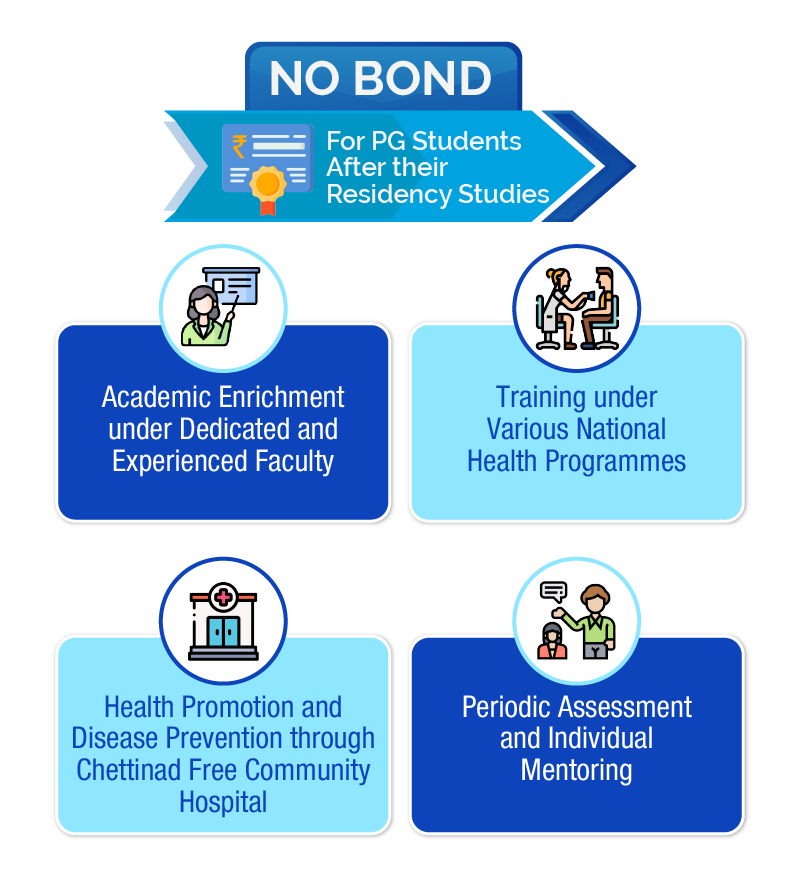
Candidates after successfully obtaining the MD Community degree can be recruited as faculty in government or private medical colleges. They can also get placements as a Full time or a part time consultant in Hospitals/ research labs. Those interested in research can pursue their PhD in the same field of specialization.
Goals
To prepare Community Physicians of highest caliber who have basic understanding of clinical practice, a thorough knowledge of epidemiological principles and methods and the epidemiology of communicable and non-communicable diseases, a familiarity with statistical methods, the relevant aspects of the social sciences and the principles of administration and management and the ability to apply this knowledge to the management of health services and the study of diseases.
Objectives
After completion of the MD Community Medicine course, the Community Medicine specialist should be able to-
- Possess an in-depth understanding of the determinants and disease in the community
-
Plan and conduct investigations into the problems of health services of the community and its special groups
-
Conduct epidemiological investigations of communicable and non-communicable diseases and suggest appropriate solutions to public health problems
- Plan, organize, implement and evaluate health services and health programs
-
Undertake teaching and training assignments in the field of community medicine for various categories of medical and paramedical personnel
- Diagnose and manage common illnesses and emergencies encountered in the community
- Function as an effective member as well as a leader of health team
-
Evaluate and interpret records and reports of health care services at various levels of health care delivery system
-
Adopt an integrated approach to meet the health needs of the individual, his family and the community.
-
To create a skilled cadre of medical professionals having expertise in application of principles of Public Health, Community Medicine and applied epidemiology, contributing meaningfully in formulating National Health Policies & Programs
- To standardize the teaching & training approaches at post- graduate level, for Community Medicine
-
Research: To formulate research questions, do literature search, conduct study with an appropriate study design and study tool; conduct data collection and management, data analysis and report.
Click here for M.D Community-Medicine Syllabus & Regulations
-
All candidates seeking admission to Post Graduate Medical & Surgical Degree courses in Chettinad Hospital and Research Institute under Chettinad Academy of Research and Education for the current academic year will have to qualify in the National Eligibility cum Entrance Test for Postgraduates, (NEET-PG) for the respective year conducted by the National Board of Examinations which is mandatory. It shall be necessary for the candidate to obtain minimum of marks at 50th percentile in ‘NEET-PG’. (However, in respect of candidates belonging to Scheduled Castes, Scheduled Tribes and other Backward Classes the minimum marks shall be at 40th percentile. The minimum qualifying mark in case of candidates with loco motor disability of lower limbs shall be at 45th percentile.)
-
As Chettinad Hospital and Research Institute is a constituent college under Chettinad Academy of Research and Education, a Deemed to be University under Section 3 of the UGC Act 1956, admissions are made on All India basis and therefore candidates belonging to any State/Union Territory of India are eligible to apply for admission. There is no restriction based on domicile.
-
The candidates must have satisfactorily completed one-year compulsory rotatory residential internship (CRRI) on or before 31st March the previous year. Candidates who have completed their internship after 31st March of the previous year shall be ineligible to participate at any stage of the admission process.
-
The candidate must have studied and completed the MBBS degree course from a recognized Medical College included in the schedules to the Indian Medical Council Act 1956, and should have obtained permanent Registration Certificate with the Medical Council of India or any of the State Medical Councils.
-
In case of a foreign national, the Medical Council of India may, on payment of the prescribed fee for registration, grant temporary registration, for the duration of the post graduate course limited to the medical college/institution to which the candidate is admitted for the time being exclusively for pursuing post graduate studies.
-
Provided further the temporary registration to such foreign national shall be subject to the condition that such person is duly registered with appropriate registering authority in his own country where from he has obtained his basic medical qualification and is duly recognized by the corresponding Medical Council or concerned authority.
MD (Doctor of Medicine) Biochemistry is a postgraduate course, which involves study of the chemical reactions and molecular changes occurring in the human body at the cellular level. This course involves a detailed study of the General Biochemistry, Physical Chemistry, Cell and Biophysics, Bio statistics, Metabolism and Nutrition, Medical Biochemistry, Metabolism and Genetics, Molecular Basis of Human Diseases, Recent Advances in Biochemistry and Biotechnology. The course includes training in the use of both basic and automated biochemistry analyzers.
The course duration is 3 years.
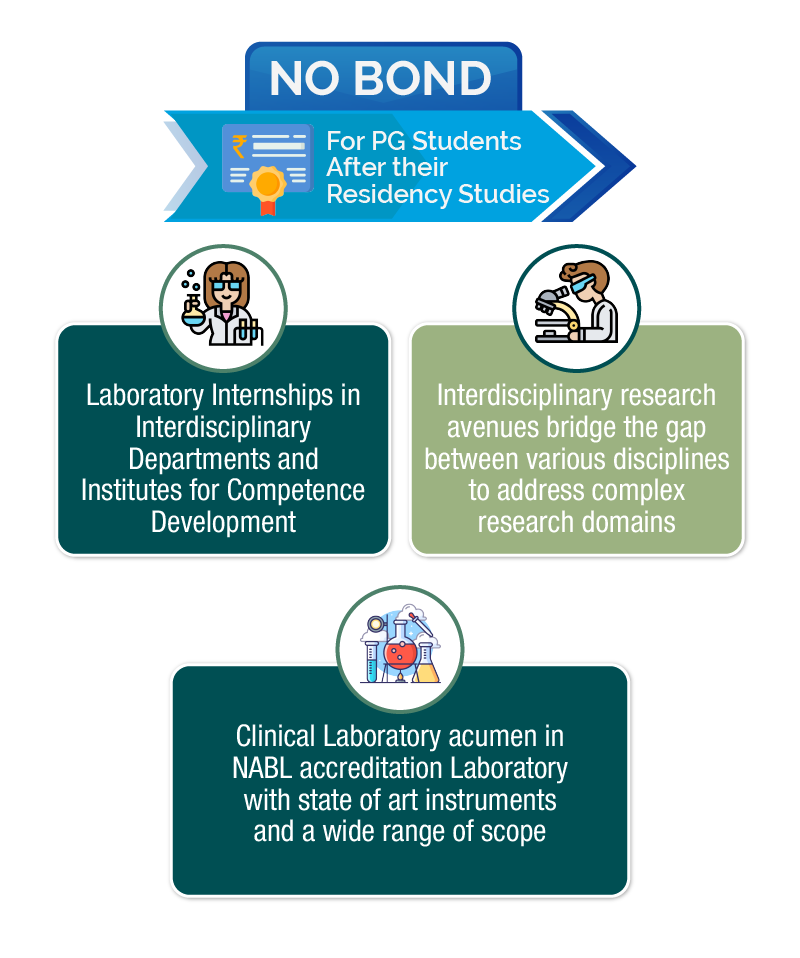
Candidates after successfully obtaining the MD Biochemistry degree can be recruited as faculty in government or private medical colleges. They can also get placements as a Full time or a part time consultant in Clinical Biochemistry Laboratories or research labs. They can also get appointed as NABL Assessors after undergoing required training. Those interested in research can pursue their PhD in the same field of specialization. They can also establish their own laboratory.
Goals
The goal of post graduate education in Biochemistry is to enable a student acquire an in-depth knowledge and understanding of life processes at the molecular level. He must acquire the knowledge of the applications of biochemistry, molecular biology, and genetics in the practice of medicine to solve clinical problems, impart knowledge to other learners and conduct research independently.
Objectives:
At the end of the MD program in Biochemistry, the post graduate student should have acquired competencies in the following areas, and be able to:
-
Explain clearly concepts and principles of biochemistry and cell biology, including correlations of these with cellular and molecular processes involved in health and disease.
- Effectively teach undergraduate students in medicine and allied health science courses
-
Establish/supervise/manage a diagnostic laboratory in Biochemistry in a hospital, ensuring quality control, and providing a reliable support service.
- Provide clinicians with consultation services for diagnostic tests in biochemistry and in interpretation of laboratory results.
-
Carry out a research project from planning to publication and be able to pursue academic interests and continue life-long learning to become more experienced in all the above areas and to eventually be able to guide postgraduates in their thesis work.
Click here for M.D Biochemistry Syllabus & Regulations
-
All candidates seeking admission to Post Graduate Medical & Surgical Degree courses in Chettinad Hospital and Research Institute under Chettinad Academy of Research and Education for the current academic year will have to qualify in the National Eligibility cum Entrance Test for Postgraduates, (NEET-PG) for the respective year conducted by the National Board of Examinations which is mandatory. It shall be necessary for the candidate to obtain minimum of marks at 50th percentile in ‘NEET-PG’. (However, in respect of candidates belonging to Scheduled Castes, Scheduled Tribes and other Backward Classes the minimum marks shall be at 40th percentile. The minimum qualifying mark in case of candidates with loco motor disability of lower limbs shall be at 45th percentile.)
-
As Chettinad Hospital and Research Institute is a constituent college under Chettinad Academy of Research and Education, a Deemed to be University under Section 3 of the UGC Act 1956, admissions are made on All India basis and therefore candidates belonging to any State/Union Territory of India are eligible to apply for admission. There is no restriction based on domicile.
-
The candidates must have satisfactorily completed one-year compulsory rotatory residential internship (CRRI) on or before 31st March the previous year. Candidates who have completed their internship after 31st March of the previous year shall be ineligible to participate at any stage of the admission process.
-
The candidate must have studied and completed the MBBS degree course from a recognized Medical College included in the schedules to the Indian Medical Council Act 1956, and should have obtained permanent Registration Certificate with the Medical Council of India or any of the State Medical Councils.
-
In case of a foreign national, the Medical Council of India may, on payment of the prescribed fee for registration, grant temporary registration, for the duration of the post graduate course limited to the medical college/institution to which the candidate is admitted for the time being exclusively for pursuing post graduate studies.
-
Provided further the temporary registration to such foreign national shall be subject to the condition that such person is duly registered with appropriate registering authority in his own country where from he has obtained his basic medical qualification and is duly recognized by the corresponding Medical Council or concerned authority.
MD (Doctor of medicine) General Medicine is a clinical postgraduate course that involves an in-depth study of the prevention, diagnosis, and treatment of adult diseases. Graduates develop a thorough knowledge in medical sciences and acquire the expertise to treat a variety of medical conditions, by integrating theoretical knowledge and practical exposure.
The course duration is 3 years.
Candidates after successful completion of the MD general medicine course have numerous job opportunities, where they can work as Physicians and Research Scholars in Educational and Research Institutes. They can also get recruited in hospitals or clinics or can also establish their own private practice. MD Medicine postgraduates are also recruited by military services, pharmaceutical, and biomedical companies. They can also pursue super specialty DM courses or PhD
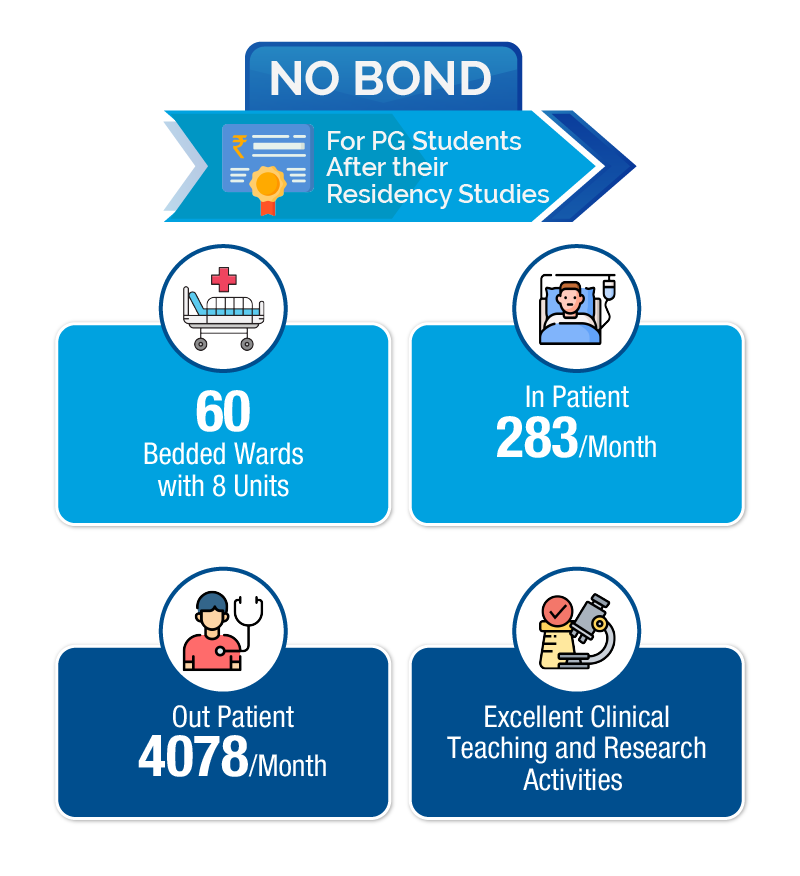
Goals
The primary goal of the MD course in General Medicine is to produce post-graduate internal medicine clinicians able to provide health care in their field.
Objectives
By the end of the MD General Medicine course the postgraduate training should enable the student to:
- Efficiently practice the internal medicine specialty, backed by scientific knowledge including basic sciences and skills
- Diagnose and manage the majority of medical conditions. (clinically and with the aid of relevant investigations).
- Exercise empathy and a caring attitude and maintain professional integrity, honesty and high ethical standards
- Plan and deliver comprehensive treatment using the principles of rational drug therapy
- Plan and advise measures for the prevention and rehabilitation of patients belonging to his specialty;
- Manage emergencies efficiently by providing Basic Life Support (BLS) and
Advanced Life Support (ALS) in emergency situations
-
Recognize conditions that may be outside the area of the specialty competence and refer them to an appropriate specialist
- Demonstrate skills in the documentation of case details including epidemiological data
- Play the assigned role in the implementation of National Health Programs
- Demonstrate competence in basic concepts of research methodology and clinical epidemiology, and preventive aspects of various disease states
- Be a motivated ‘teacher’ – defined as one keen to share knowledge and skills with a colleague or a junior or any learner
-
Continue to evince keen interest in continuing education irrespective of whether he/she is in a teaching institution or is practicing and use appropriate learning resources
- Be well versed with his medico-legal responsibilities
-
Undertake audit, use information technology tools, and carry out research- both basic and clinical, with the aim of publishing the work and presenting the work at scientific forums.
-
The student should be able to recognize the mental condition characterized by self-absorption and reduced ability to respond to the outside world (e.g. Autism),
abnormal functioning in social interaction with or without repetitive behavior and/or poor communications,
etc.The intended outcome of a competency-based program is a consultant specialist who can practice medicine at a defined level of competency in different practice settings
such as ambulatory (outpatient), inpatient, intensive care, and emergency medicine.
Click here for M.D General Medicine Syllabus & Regulations
-
All candidates seeking admission to Post Graduate Medical & Surgical Degree courses in Chettinad Hospital and Research Institute under Chettinad Academy of Research and Education for the current academic year will have to qualify in the National Eligibility cum Entrance Test for Postgraduates, (NEET-PG) for the respective year conducted by the National Board of Examinations which is mandatory. It shall be necessary for the candidate to obtain minimum of marks at 50th percentile in ‘NEET-PG’. (However, in respect of candidates belonging to Scheduled Castes, Scheduled Tribes and other Backward Classes the minimum marks shall be at 40th percentile. The minimum qualifying mark in case of candidates with loco motor disability of lower limbs shall be at 45th percentile.)
-
As Chettinad Hospital and Research Institute is a constituent college under Chettinad Academy of Research and Education, a Deemed to be University under Section 3 of the UGC Act 1956, admissions are made on All India basis and therefore candidates belonging to any State/Union Territory of India are eligible to apply for admission. There is no restriction based on domicile.
-
The candidates must have satisfactorily completed one-year compulsory rotatory residential internship (CRRI) on or before 31st March the previous year. Candidates who have completed their internship after 31st March of the previous year shall be ineligible to participate at any stage of the admission process.
-
The candidate must have studied and completed the MBBS degree course from a recognized Medical College included in the schedules to the Indian Medical Council Act 1956, and should have obtained permanent Registration Certificate with the Medical Council of India or any of the State Medical Councils.
-
In case of a foreign national, the Medical Council of India may, on payment of the prescribed fee for registration, grant temporary registration, for the duration of the post graduate course limited to the medical college/institution to which the candidate is admitted for the time being exclusively for pursuing post graduate studies.
-
Provided further the temporary registration to such foreign national shall be subject to the condition that such person is duly registered with appropriate registering authority in his own country where from he has obtained his basic medical qualification and is duly recognized by the corresponding Medical Council or concerned authority.
MD (Doctor of medicine) Anesthesiology is a clinical postgraduate course and a speciality of medicine which comprises of study on pre-operative and post-operative care of the patient, critical care and pain management.
The course duration is 3 years.
Candidates after successful completion of the MD Anesthesiology course have numerous job opportunities, where they can seek employment as faculty in Educational Institutes. They can also get recruited in hospitals or can also establish their own practice. They can also work in critical care units.
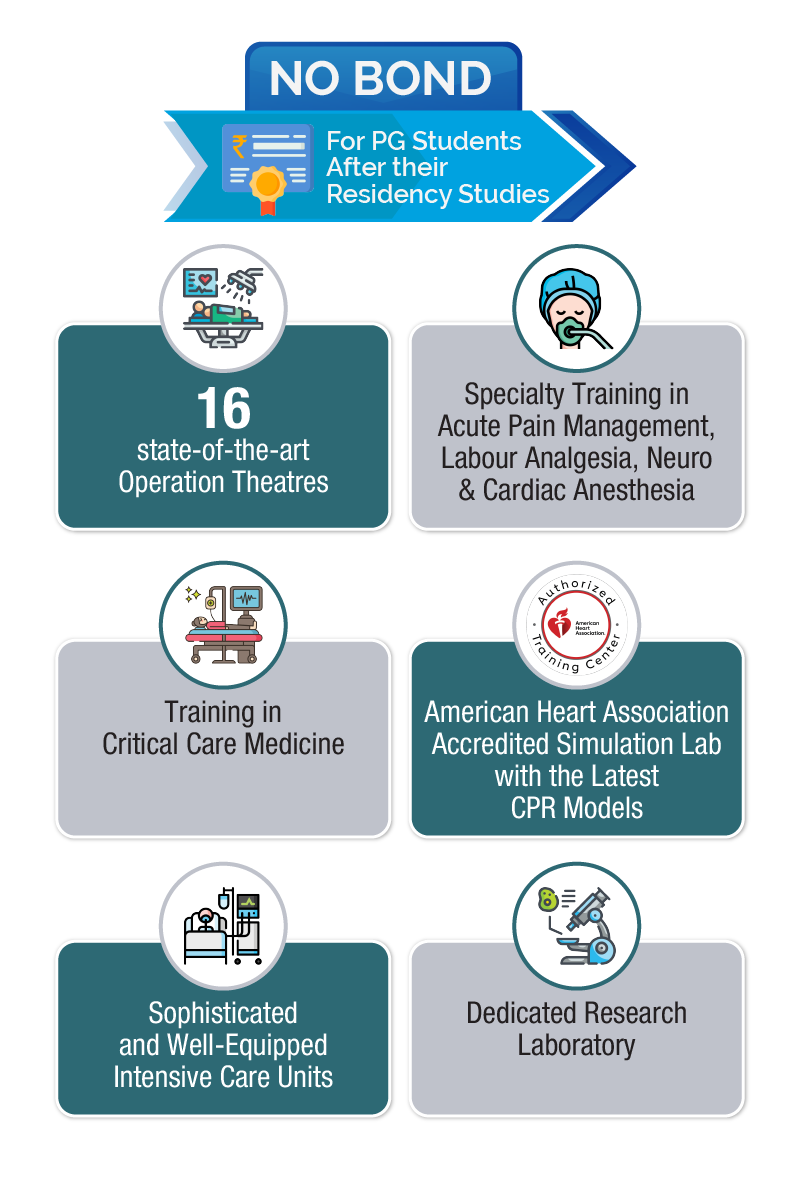
Goals
The primary goal of the MD Anaesthesiology course is to produce post graduate clinicians able to provide health care in the field of anaesthesiology.
Objectives
By the end of the MD Anaesthesiology, course the postgraduate training should enable the student to:
- Have fair knowledge of basic sciences as applied to Anaesthesia.
- Acquire in-depth knowledge in that speciality including recent advances.
-
Be fully conversant with the bedside procedures (diagnostic and therapeutic) and have knowledge of latest diagnostics and therapeutics procedures available including radiological methods.
-
Learn the basic methodology of teaching and develop competence in teaching medical/paramedical students. He/She should become familiar with the latest teaching (computer and power point presentation) modes including simulators training and evidence based medical education.
-
Develop an attitude that leads to appropriate communication with colleagues to function in a group in Operating Room /Intensive Care Unit, and develop the ability to function as a leader in the operating room.
Click here for M.D Anaesthesiology Syllabus & Regulations
-
All candidates seeking admission to Post Graduate Medical & Surgical Degree courses in Chettinad Hospital and Research Institute under Chettinad Academy of Research and Education for the current academic year will have to qualify in the National Eligibility cum Entrance Test for Postgraduates, (NEET-PG) for the respective year conducted by the National Board of Examinations which is mandatory. It shall be necessary for the candidate to obtain minimum of marks at 50th percentile in ‘NEET-PG’. (However, in respect of candidates belonging to Scheduled Castes, Scheduled Tribes and other Backward Classes the minimum marks shall be at 40th percentile. The minimum qualifying mark in case of candidates with loco motor disability of lower limbs shall be at 45th percentile.)
-
As Chettinad Hospital and Research Institute is a constituent college under Chettinad Academy of Research and Education, a Deemed to be University under Section 3 of the UGC Act 1956, admissions are made on All India basis and therefore candidates belonging to any State/Union Territory of India are eligible to apply for admission. There is no restriction based on domicile.
-
The candidates must have satisfactorily completed one-year compulsory rotatory residential internship (CRRI) on or before 31st March the previous year. Candidates who have completed their internship after 31st March of the previous year shall be ineligible to participate at any stage of the admission process.
-
The candidate must have studied and completed the MBBS degree course from a recognized Medical College included in the schedules to the Indian Medical Council Act 1956, and should have obtained permanent Registration Certificate with the Medical Council of India or any of the State Medical Councils.
-
In case of a foreign national, the Medical Council of India may, on payment of the prescribed fee for registration, grant temporary registration, for the duration of the post graduate course limited to the medical college/institution to which the candidate is admitted for the time being exclusively for pursuing post graduate studies.
-
Provided further the temporary registration to such foreign national shall be subject to the condition that such person is duly registered with appropriate registering authority in his own country where from he has obtained his basic medical qualification and is duly recognized by the corresponding Medical Council or concerned authority.
Doctor of Medicine in Dermatology, Venerology & Leprosy is a three-year postgraduation course in Dermatology which is a branch of medicine dealing with diseases of the hair, nails, skin. This is an exclusive speciality comprising of both medical and surgical aspects and encompasses the removal of scars from skin, skin tags, warts etc. Dermatologists also perform elective procedures like botox injections, laser hair removal and hair transplant, collagen injections etc.
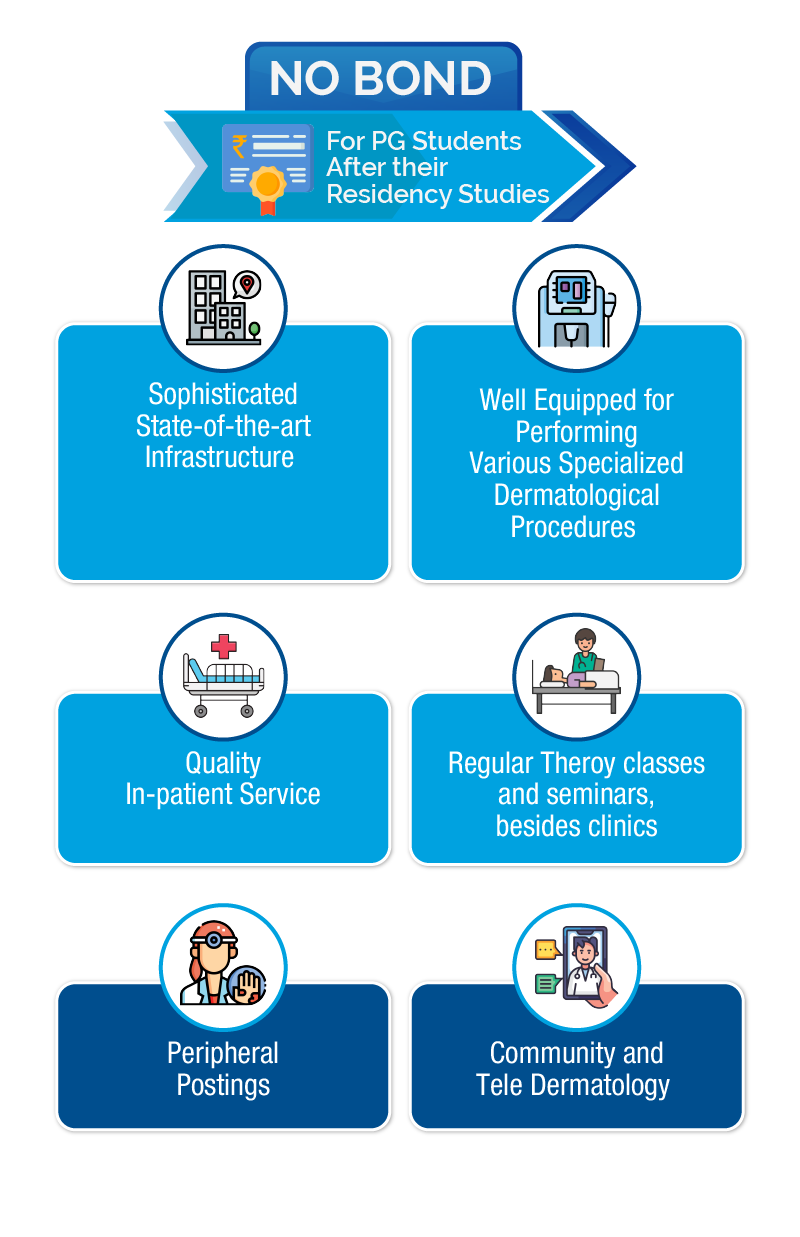
The course duration is 3 years and it includes detailed study of topics like immunology of dermatological diseases, cellular and molecular inflammation, skin genetics, skin structure and development of skin, basic reactions of skin, repair and carcinogenesis.
Candidates after successful completion of the course can get employed as faculty in medical colleges or as consultants in hospitals and clinics. They can also further specialize in cosmetic dermatology which is an upcoming and much sought-after field. Those interested in research can enroll for PhD program also.
Goals
The primary goal of the MD course in Dermatology is to produce post graduate clinicians capable of providing health care in the field of dermatology and venereology.
Objectives
At the end of the 3 years of post-graduate training in Dermatology, Venereology &
Leprosy the postgraduate student in MD DERMATOLOGY should have:
- Acquired knowledge of basic sciences as applied to dermatology.
- Acquired in-depth knowledge of his subject including recent advances.
-
Be fully conversant with the bedside procedures (diagnostic and therapeutic) and having knowledge of latest diagnostics and therapeutics available.
- Acquired practical and procedural skills related to the subject.
- Critically evaluate, initiate investigation and clinically manage cases in
Dermatology, Venereology and Leprosy with the help of relevant investigations.
-
Plan and advise measures for the prevention and rehabilitation of patients with various dermatological conditions.
- Ensure the implementation of National Health Programs, particularly in
sexually transmitted diseases (STD) and leprosy.
- Acquire training skills in research methodology, professionalism, attitude and
communication skills and problem-solving skills.
- Practice the specialty of dermatology ethically.
- Learn the basic methodology of teaching and develop competence in teaching medical/paramedical students.
Click here for M.D Dermatology Syllabus & Regulations
-
All candidates seeking admission to Post Graduate Medical & Surgical Degree courses in Chettinad Hospital and Research Institute under Chettinad Academy of Research and Education for the current academic year will have to qualify in the National Eligibility cum Entrance Test for Postgraduates, (NEET-PG) for the respective year conducted by the National Board of Examinations which is mandatory. It shall be necessary for the candidate to obtain minimum of marks at 50th percentile in ‘NEET-PG’. (However, in respect of candidates belonging to Scheduled Castes, Scheduled Tribes and other Backward Classes the minimum marks shall be at 40th percentile. The minimum qualifying mark in case of candidates with loco motor disability of lower limbs shall be at 45th percentile.)
-
As Chettinad Hospital and Research Institute is a constituent college under Chettinad Academy of Research and Education, a Deemed to be University under Section 3 of the UGC Act 1956, admissions are made on All India basis and therefore candidates belonging to any State/Union Territory of India are eligible to apply for admission. There is no restriction based on domicile.
-
The candidates must have satisfactorily completed one-year compulsory rotatory residential internship (CRRI) on or before 31st March the previous year. Candidates who have completed their internship after 31st March of the previous year shall be ineligible to participate at any stage of the admission process.
-
The candidate must have studied and completed the MBBS degree course from a recognized Medical College included in the schedules to the Indian Medical Council Act 1956, and should have obtained permanent Registration Certificate with the Medical Council of India or any of the State Medical Councils.
-
In case of a foreign national, the Medical Council of India may, on payment of the prescribed fee for registration, grant temporary registration, for the duration of the post graduate course limited to the medical college/institution to which the candidate is admitted for the time being exclusively for pursuing post graduate studies.
-
Provided further the temporary registration to such foreign national shall be subject to the condition that such person is duly registered with appropriate registering authority in his own country where from he has obtained his basic medical qualification and is duly recognized by the corresponding Medical Council or concerned authority.
MD in Respiratory Medicine is a clinical postgraduate course which involves a detailed study of lung diseases, their pathogenesis, management and prevention and it encompasses a range of diagnostic and therapeutic procedures associated with pulmonary and critical care medicine.
The program trains the postgraduates in clinical pulmonary and critical care medicine, and offers an introduction to clinical and basic science research.
The course duration is 3 years.
Candidates on successful completion of the course can get placed as faculty in medical colleges or as consultants in hospitals or clinics. They can also pursue their PhD, if they are inclined towards research.
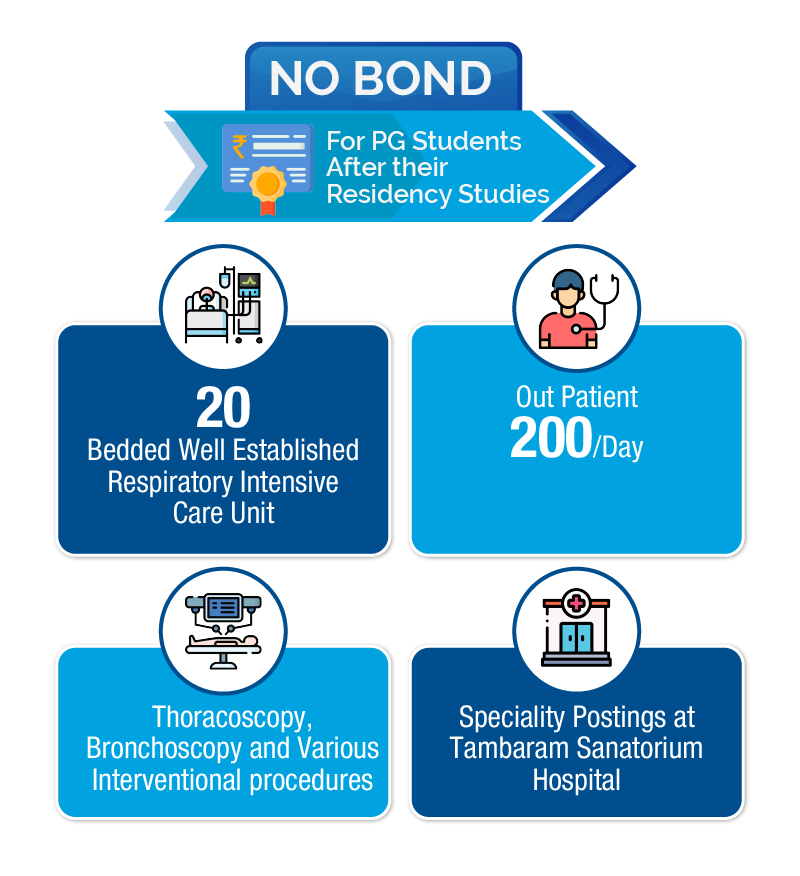
Goals
The primary goal of the MD course in Pulmonary Medicine is to produce post graduate clinicians able to provide health care in the field of pulmonary medicine.
Objectives
It is expected that a physician qualified in Pulmonary Medicine at the end of the course should be able to:
-
Diagnose and treat pulmonary diseases, take preventive and curative steps for these diseases in the community at all levels of health care and qualify as a consultant and teacher in the subject.
-
The student should have acquired theoretical knowledge of different aspects of Pulmonary Medicine including the status in health and disease, clinical and practical skill.
- Patient management in the outpatient, inpatient and emergency situations including intensive care
Click here for M.D Respiratory Medicine Syllabus & Regulations
-
All candidates seeking admission to Post Graduate Medical & Surgical Degree courses in Chettinad Hospital and Research Institute under Chettinad Academy of Research and Education for the current academic year will have to qualify in the National Eligibility cum Entrance Test for Postgraduates, (NEET-PG) for the respective year conducted by the National Board of Examinations which is mandatory. It shall be necessary for the candidate to obtain minimum of marks at 50th percentile in ‘NEET-PG’. (However, in respect of candidates belonging to Scheduled Castes, Scheduled Tribes and other Backward Classes the minimum marks shall be at 40th percentile. The minimum qualifying mark in case of candidates with loco motor disability of lower limbs shall be at 45th percentile.)
-
As Chettinad Hospital and Research Institute is a constituent college under Chettinad Academy of Research and Education, a Deemed to be University under Section 3 of the UGC Act 1956, admissions are made on All India basis and therefore candidates belonging to any State/Union Territory of India are eligible to apply for admission. There is no restriction based on domicile.
-
The candidates must have satisfactorily completed one-year compulsory rotatory residential internship (CRRI) on or before 31st March the previous year. Candidates who have completed their internship after 31st March of the previous year shall be ineligible to participate at any stage of the admission process.
-
The candidate must have studied and completed the MBBS degree course from a recognized Medical College included in the schedules to the Indian Medical Council Act 1956, and should have obtained permanent Registration Certificate with the Medical Council of India or any of the State Medical Councils.
-
In case of a foreign national, the Medical Council of India may, on payment of the prescribed fee for registration, grant temporary registration, for the duration of the post graduate course limited to the medical college/institution to which the candidate is admitted for the time being exclusively for pursuing post graduate studies.
-
Provided further the temporary registration to such foreign national shall be subject to the condition that such person is duly registered with appropriate registering authority in his own country where from he has obtained his basic medical qualification and is duly recognized by the corresponding Medical Council or concerned authority.
MD (Doctor of Medicine) in Paediatrics is a clinical postgraduate program that focuses on the management of disease conditions occurring in infants, children and adolescents up to the age of 18 years. They deal with all aspects of child health including physical, mental and behavioral.
The course duration is 3 years.
Pediatricians can find various avenues for employment, few being Faculty in Private and Government medical colleges, consultants in clinics and hospitals, research laboratories. They can also pursue DM or PhD.
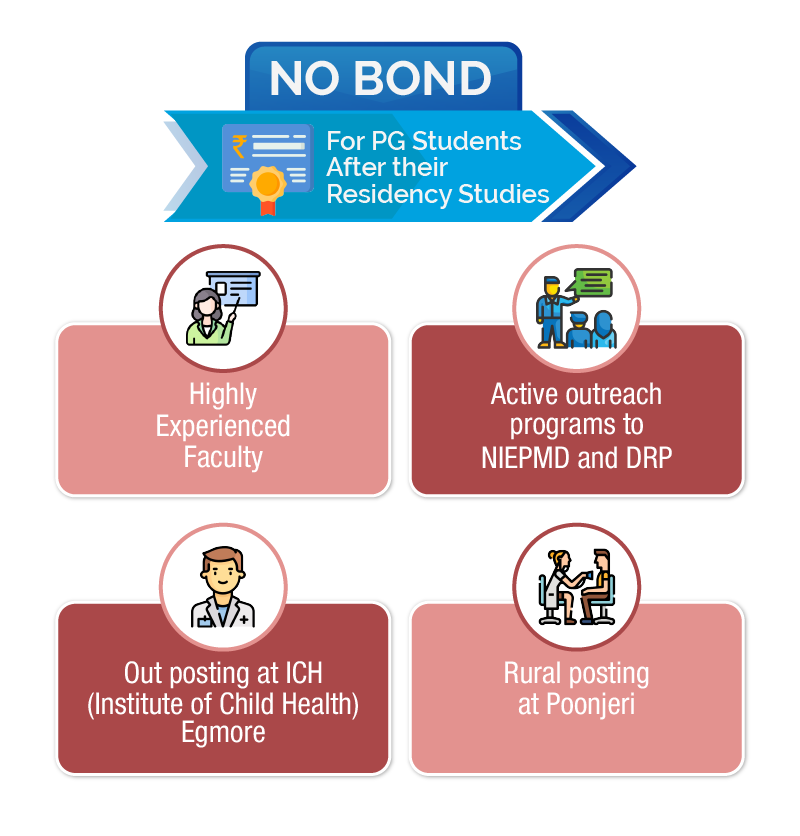
Goal
The primary goal of the MD course in Pediatrics is to produce qualified post graduate clinicians able to provide health care in the field of Pediatrics.
Objectives
The objectives of MD Course in Paediatrics is to produce a competent pediatrician who:
-
Recognizes the health needs of infants, children and adolescents and carries out professional obligations in keeping with principles of the National Health Policy and professional ethics.
-
Has acquired the competencies pertaining to Paediatrics that are required to be practiced in the community and at all levels of health system
- Acquired skills in effectively communicating with the child, family and the
community
- Is aware of contemporary advances and developments in medical sciences as
related to child health
- Is oriented to principles of research methodology
- Has acquired skills in educating medical and paramedical professionals
Is able to recognize mental conditions and collaborate with Psychiatrists/Child Psychologists for the treatment of such patients.
Click here for M.D Paediatrics Syllabus and Regulations
-
All candidates seeking admission to Post Graduate Medical & Surgical Degree courses in Chettinad Hospital and Research Institute under Chettinad Academy of Research and Education for the current academic year will have to qualify in the National Eligibility cum Entrance Test for Postgraduates, (NEET-PG) for the respective year conducted by the National Board of Examinations which is mandatory. It shall be necessary for the candidate to obtain minimum of marks at 50th percentile in ‘NEET-PG’. (However, in respect of candidates belonging to Scheduled Castes, Scheduled Tribes and other Backward Classes the minimum marks shall be at 40th percentile. The minimum qualifying mark in case of candidates with loco motor disability of lower limbs shall be at 45th percentile.)
-
As Chettinad Hospital and Research Institute is a constituent college under Chettinad Academy of Research and Education, a Deemed to be University under Section 3 of the UGC Act 1956, admissions are made on All India basis and therefore candidates belonging to any State/Union Territory of India are eligible to apply for admission. There is no restriction based on domicile.
-
The candidates must have satisfactorily completed one-year compulsory rotatory residential internship (CRRI) on or before 31st March the previous year. Candidates who have completed their internship after 31st March of the previous year shall be ineligible to participate at any stage of the admission process.
-
The candidate must have studied and completed the MBBS degree course from a recognized Medical College included in the schedules to the Indian Medical Council Act 1956, and should have obtained permanent Registration Certificate with the Medical Council of India or any of the State Medical Councils.
-
In case of a foreign national, the Medical Council of India may, on payment of the prescribed fee for registration, grant temporary registration, for the duration of the post graduate course limited to the medical college/institution to which the candidate is admitted for the time being exclusively for pursuing post graduate studies.
-
Provided further the temporary registration to such foreign national shall be subject to the condition that such person is duly registered with appropriate registering authority in his own country where from he has obtained his basic medical qualification and is duly recognized by the corresponding Medical Council or concerned authority.
MD (Doctor of Medicine) course in Psychiatry is an in-depth study and training in the medical speciality which comprises of the assessment, diagnosis, and treatment of mental, emotional, and behavioral disorders in people. The psychiatrists extensively delve into the patients psyche in order to understand the causes of depression, schizophrenia and try to help the patients by offering a specific blend of counselling and medications.
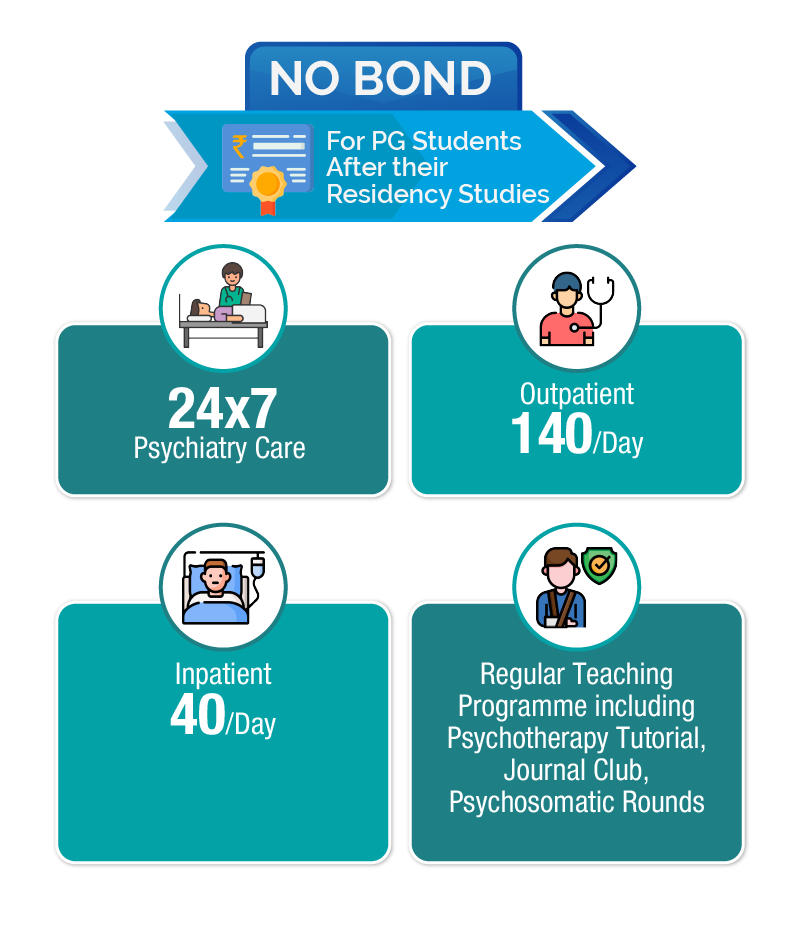
Goal
The primary goal of the MD course in Psychiatry is to produce a post graduate clinician able to provide health care in the field of Psychiatry.
Objectives
A physician qualified in Psychiatry should be able to:
-
Diagnose and treat psychiatric disorders, take preventive and curative steps for the disease in the community at all levels of health care and qualify as a consultant and teacher in the subject.
-
Understand the relevance of mental health in relation to the health needs of the country
- Ethical considerations in the teaching and practice of Psychiatry
- Identify the social, economic, biological and emotional determinants of mental Health
- Identify the environmental causes as determinants of mental health
- Institute appropriate diagnostic, therapeutic and rehabilitative procedures to the mentally ill patient
-
Take detailed history, conduct appropriate ethically valid physical examination and institute appropriate evaluation procedures to make a correct clinical diagnosis.
- Perform relevant investigative and therapeutic procedures for the psychiatric Patient
- Plan and deliver comprehensive treatment of a psychiatric patient using principles of rational drug therapy
- Plan rehabilitation of psychiatric patient suffering from chronic illness
- Clinically manage psychiatric emergencies efficiently
- Demonstrate empathy and humane approach towards patients and their families and respect their sensibilities
-
Demonstrate communication skills of a high order in explaining management and prognosis, providing counseling and giving health education messages to patients, families and communities
- Develop appropriate skills to practice evidence-based psychiatry
- Demonstrate competence in basic concepts of research methodology and epidemiology
- Be aware of and take appropriate steps in the implementation of national mental health programs, effectively and responsibly
- Be aware of the legal issues in the practice of Psychiatry
- Be aware of the special requirements in the practice of Child and adolescent Psychiatry and Geriatric Psychiatry
Learn the basic methodology of teaching and develop competence in teaching medical/paramedical students, health professionals, members of allied disciplines (e.g. behavioral sciences), law enforcement agencies, families and consumers and members of the public.
Click here for M.D Psychiatry Syllabus & Regulations
-
All candidates seeking admission to Post Graduate Medical & Surgical Degree courses in Chettinad Hospital and Research Institute under Chettinad Academy of Research and Education for the current academic year will have to qualify in the National Eligibility cum Entrance Test for Postgraduates, (NEET-PG) for the respective year conducted by the National Board of Examinations which is mandatory. It shall be necessary for the candidate to obtain minimum of marks at 50th percentile in ‘NEET-PG’. (However, in respect of candidates belonging to Scheduled Castes, Scheduled Tribes and other Backward Classes the minimum marks shall be at 40th percentile. The minimum qualifying mark in case of candidates with loco motor disability of lower limbs shall be at 45th percentile.)
-
As Chettinad Hospital and Research Institute is a constituent college under Chettinad Academy of Research and Education, a Deemed to be University under Section 3 of the UGC Act 1956, admissions are made on All India basis and therefore candidates belonging to any State/Union Territory of India are eligible to apply for admission. There is no restriction based on domicile.
-
The candidates must have satisfactorily completed one-year compulsory rotatory residential internship (CRRI) on or before 31st March the previous year. Candidates who have completed their internship after 31st March of the previous year shall be ineligible to participate at any stage of the admission process.
-
The candidate must have studied and completed the MBBS degree course from a recognized Medical College included in the schedules to the Indian Medical Council Act 1956, and should have obtained permanent Registration Certificate with the Medical Council of India or any of the State Medical Councils.
-
In case of a foreign national, the Medical Council of India may, on payment of the prescribed fee for registration, grant temporary registration, for the duration of the post graduate course limited to the medical college/institution to which the candidate is admitted for the time being exclusively for pursuing post graduate studies.
-
Provided further the temporary registration to such foreign national shall be subject to the condition that such person is duly registered with appropriate registering authority in his own country where from he has obtained his basic medical qualification and is duly recognized by the corresponding Medical Council or concerned authority.
MD (Doctor of Medicine) in Radiodiagnosis is a postgraduation course in a field of medicine that employs radiation or magnetic resonance or ultrasound in the diagnosis, therapy of disease conditions and also in research.
The course duration is 3 years.
Candidates after specializing in this field can join a govt or private hospital as a consultant or get employment as faculty in academic/educational institutions. They can also do private practices of medical imaging for the genitourinary, biliary, gastrointestinal, central nervous system, and other organs like brain, head and neck, through the use of x-ray, MRI, CT, and angiography.
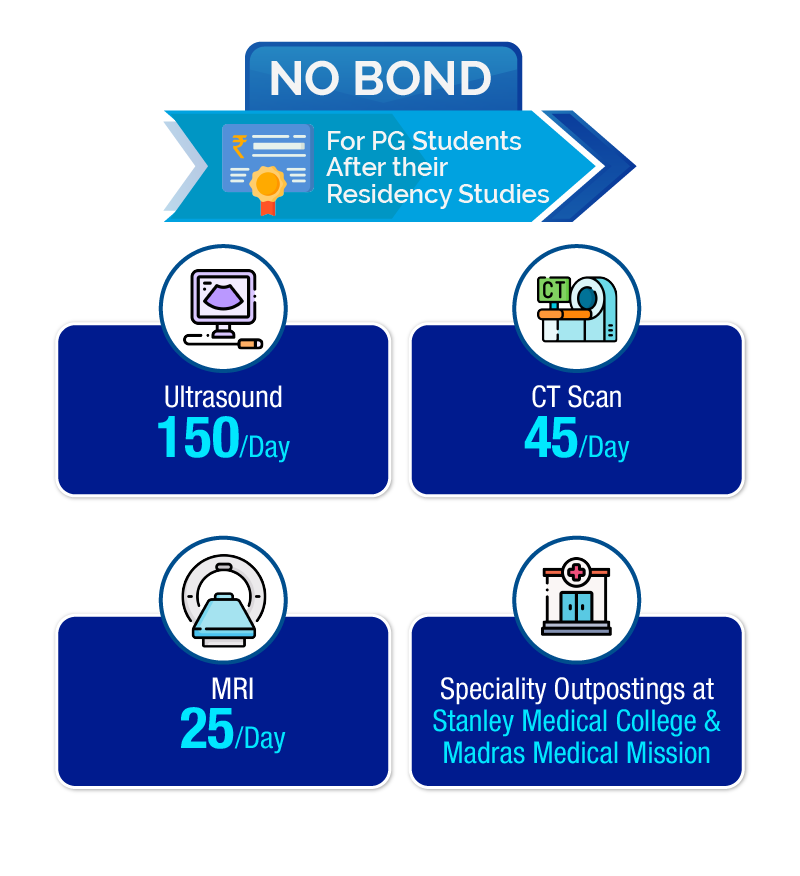
Goal
The Goal of this program is to impart training in conventional and modern radiology and imaging techniques so that the post graduate student becomes well versed and competent to practice, teach and conduct research in the discipline of radiology.
Objectives
- The student should also acquire basic knowledge in the various sub-specialties of radiology.
-
The objective of the program is to train a student to become a skilled and competent radiologist to conduct and interpret various diagnostic/interventional imaging studies (both conventional and advanced imaging), to organize and conduct research and teaching activities and be well versed with medical ethics and legal aspects of imaging/ intervention
To train the future leaders of radiology by offering rich clinical exposure through a wide variety of rotations that provide care to the diverse patient populations.
Click here for M.D Radiodiagnosis Syllabus and Regulations
-
All candidates seeking admission to Post Graduate Medical & Surgical Degree courses in Chettinad Hospital and Research Institute under Chettinad Academy of Research and Education for the current academic year will have to qualify in the National Eligibility cum Entrance Test for Postgraduates, (NEET-PG) for the respective year conducted by the National Board of Examinations which is mandatory. It shall be necessary for the candidate to obtain minimum of marks at 50th percentile in ‘NEET-PG’. (However, in respect of candidates belonging to Scheduled Castes, Scheduled Tribes and other Backward Classes the minimum marks shall be at 40th percentile. The minimum qualifying mark in case of candidates with loco motor disability of lower limbs shall be at 45th percentile.)
-
As Chettinad Hospital and Research Institute is a constituent college under Chettinad Academy of Research and Education, a Deemed to be University under Section 3 of the UGC Act 1956, admissions are made on All India basis and therefore candidates belonging to any State/Union Territory of India are eligible to apply for admission. There is no restriction based on domicile.
-
The candidates must have satisfactorily completed one-year compulsory rotatory residential internship (CRRI) on or before 31st March the previous year. Candidates who have completed their internship after 31st March of the previous year shall be ineligible to participate at any stage of the admission process.
-
The candidate must have studied and completed the MBBS degree course from a recognized Medical College included in the schedules to the Indian Medical Council Act 1956, and should have obtained permanent Registration Certificate with the Medical Council of India or any of the State Medical Councils.
-
In case of a foreign national, the Medical Council of India may, on payment of the prescribed fee for registration, grant temporary registration, for the duration of the post graduate course limited to the medical college/institution to which the candidate is admitted for the time being exclusively for pursuing post graduate studies.
-
Provided further the temporary registration to such foreign national shall be subject to the condition that such person is duly registered with appropriate registering authority in his own country where from he has obtained his basic medical qualification and is duly recognized by the corresponding Medical Council or concerned authority.
| Medical Post Graduate Courses – Sports Medicine (M.D./M.S. Clinical – 3 Years) |
The period of course for obtaining M.D. and M.S. degrees will be three completed years including the period of examination. Provided that in the case of students possessing a recognized two year post graduate diploma course in the same subject, the period of training including the period of examination will be two years
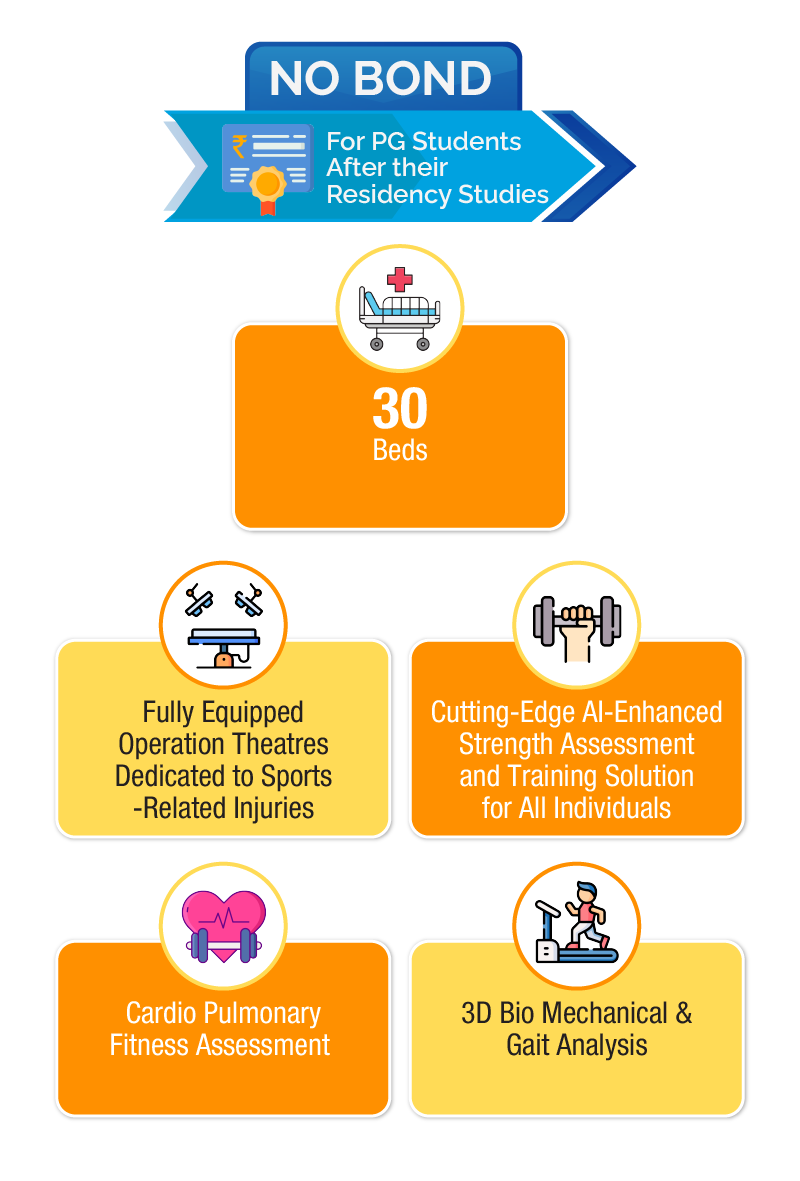
-
All candidates seeking admission to Post Graduate Medical & Surgical Degree courses in Chettinad Hospital and Research Institute under Chettinad Academy of Research and Education for the current academic year will have to qualify in the National Eligibility cum Entrance Test for Postgraduates, (NEET-PG) for the respective year conducted by the National Board of Examinations which is mandatory. It shall be necessary for the candidate to obtain minimum of marks at 50th percentile in ‘NEET-PG’. (However, in respect of candidates belonging to Scheduled Castes, Scheduled Tribes and other Backward Classes the minimum marks shall be at 40th percentile. The minimum qualifying mark in case of candidates with loco motor disability of lower limbs shall be at 45th percentile.)
-
As Chettinad Hospital and Research Institute is a constituent college under Chettinad Academy of Research and Education, a Deemed to be University under Section 3 of the UGC Act 1956, admissions are made on All India basis and therefore candidates belonging to any State/Union Territory of India are eligible to apply for admission. There is no restriction based on domicile.
-
The candidates must have satisfactorily completed one-year compulsory rotatory residential internship (CRRI) on or before 31st March the previous year. Candidates who have completed their internship after 31st March of the previous year shall be ineligible to participate at any stage of the admission process.
-
The candidate must have studied and completed the MBBS degree course from a recognized Medical College included in the schedules to the Indian Medical Council Act 1956, and should have obtained permanent Registration Certificate with the Medical Council of India or any of the State Medical Councils.
-
In case of a foreign national, the Medical Council of India may, on payment of the prescribed fee for registration, grant temporary registration, for the duration of the post graduate course limited to the medical college/institution to which the candidate is admitted for the time being exclusively for pursuing post graduate studies.
-
Provided further the temporary registration to such foreign national shall be subject to the condition that such person is duly registered with appropriate registering authority in his own country where from he has obtained his basic medical qualification and is duly recognized by the corresponding Medical Council or concerned authority.
MS (Master of Surgery) in ENT or Otorhinolaryngology is a postgraduate surgical speciality course that involves the management of patients with diseases of the ear, nose, throat, head and neck.
The course duration is 3 years.
Candidates after successfully obtaining the MS ENT degree can be placed as teaching faculty in government and private medical colleges or work as consultants in hospitals or clinics or take up a private practice. They can also further specialize in any field of ENT and obtain fellowships in pediatric otorhinolaryngology, head and neck oncology etc. Interested candidates can register for Ph.D. or take up research work with ICMR.
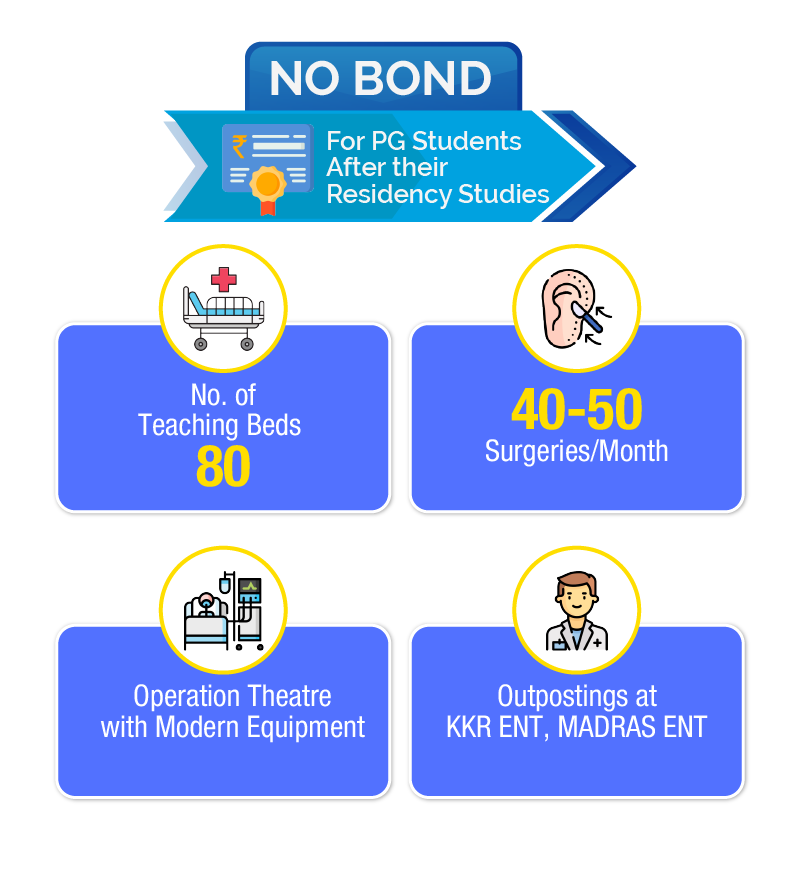
Goal
The primary goal of the MS ENT course is to produce a post graduate clinician and surgeon with the ability to provide health care in Otorhinolaryngology.
Objectives
At the end of postgraduate training the student should be able to:
- Practice his speciality ethically keeping in mind the requirement of the patient, community and people at large.
- Demonstrate sufficient understanding of basic sciences related to his specialty and be able to integrate such knowledge in his Clinical practice.
- Diagnose and manage the majority of conditions in his specialty (clinically and with the help of relevant investigations)
- Plan and advice measures for the promotive, preventive, curative and rehabilitative aspects of health and diseases in the specialty of ENT.
- Should be able to demonstrate his cognitive skills in the field of ENT and its ancillary branches during the formative and summative evaluation processes.
- Play the assigned role in the implementation of National Health Programs
- Demonstrate competence in basic concepts of research methodology and writing thesis and research papers.
- Develop good learning, communication and teaching skills.
- Demonstrate sufficient understanding of basic sciences and the clinical applications related to the specialty to be able to integrate this knowledge into clinical practice.
- Acquire in-depth knowledge in the subject including recent advances.
- Demonstrate that he is fully conversant with the latest diagnostics & therapeutics available.
Click here for M.S. (Otorhinolaryngology) ENT Syllabus & Regulations
-
All candidates seeking admission to Post Graduate Medical & Surgical Degree courses in Chettinad Hospital and Research Institute under Chettinad Academy of Research and Education for the current academic year will have to qualify in the National Eligibility cum Entrance Test for Postgraduates, (NEET-PG) for the respective year conducted by the National Board of Examinations which is mandatory. It shall be necessary for the candidate to obtain minimum of marks at 50th percentile in ‘NEET-PG’. (However, in respect of candidates belonging to Scheduled Castes, Scheduled Tribes and other Backward Classes the minimum marks shall be at 40th percentile. The minimum qualifying mark in case of candidates with loco motor disability of lower limbs shall be at 45th percentile.)
-
As Chettinad Hospital and Research Institute is a constituent college under Chettinad Academy of Research and Education, a Deemed to be University under Section 3 of the UGC Act 1956, admissions are made on All India basis and therefore candidates belonging to any State/Union Territory of India are eligible to apply for admission. There is no restriction based on domicile.
-
The candidates must have satisfactorily completed one-year compulsory rotatory residential internship (CRRI) on or before 31st March the previous year. Candidates who have completed their internship after 31st March of the previous year shall be ineligible to participate at any stage of the admission process.
-
The candidate must have studied and completed the MBBS degree course from a recognized Medical College included in the schedules to the Indian Medical Council Act 1956, and should have obtained permanent Registration Certificate with the Medical Council of India or any of the State Medical Councils.
-
In case of a foreign national, the Medical Council of India may, on payment of the prescribed fee for registration, grant temporary registration, for the duration of the post graduate course limited to the medical college/institution to which the candidate is admitted for the time being exclusively for pursuing post graduate studies.
-
Provided further the temporary registration to such foreign national shall be subject to the condition that such person is duly registered with appropriate registering authority in his own country where from he has obtained his basic medical qualification and is duly recognized by the corresponding Medical Council or concerned authority.
MS (Master of Surgery) in Orthopaedics is a surgical postgraduation course which involves a detailed study of diseases of the musculoskeletal system. The students are trained to use surgical and nonsurgical methods to treat fractures and dislocations, other trauma to the musculoskeletal system, congenital disorders, tumors, sports injuries, bone and joint infections and other degenerative conditions.
The course duration is 3 years.
Candidates after successfully obtaining the MS Orthopaedics degree can be placed as teaching faculty in government and private medical colleges or work as consultants in hospitals or clinics or take up private practice. They can also further specialize in any field of Orthopedics and obtain fellowships in arthroscopic surgery, shoulder, hip, spine surgery etc. Interested candidates can register for PhD or take up research work with ICMR.
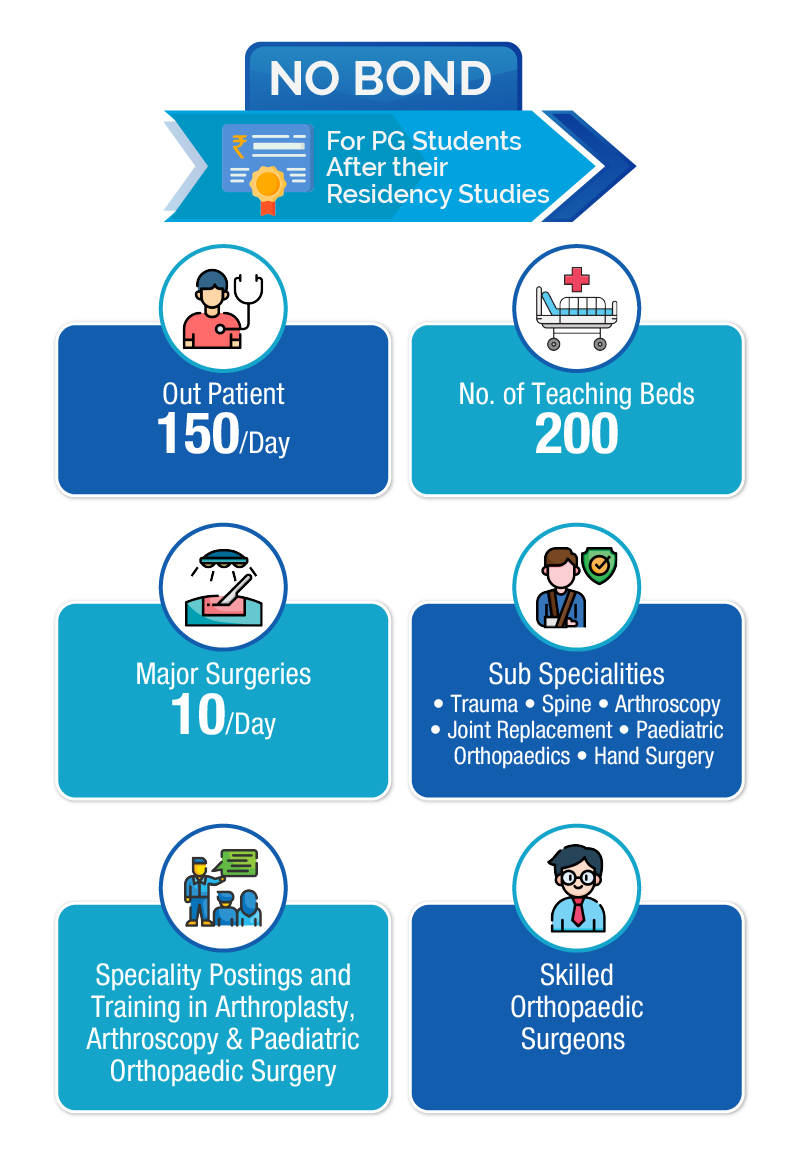
Goal
The primary goal of the MS Orthopaedics course is to produce a post graduate clinician and surgeon with the ability to provide health care in the field of Orthopedics.
Objectives
A postgraduate undergoing training MS in Orthopaedics should be trained to identify and recognize various congenital, developmental, inflammatory, infective, traumatic, metabolic, neuromuscular, degenerative and oncologic disorders of the musculoskeletal systems. She/he should be able to provide competent professional services to trauma and orthopaedic patients at a primary/ secondary/tertiary healthcare center.
This will be dealt with under the following headings:
- Theoretical knowledge (Cognitive domain)
- Practical and clinical skills (psychomotor domain)
- Attitudes including communication skills (Affective Domain)
- Writing thesis / Reviewing Research activities (Scholarly activity)
- Training in Research Methodology (Practice-based learning; Evidence-based practice)
- Professionalism
- Teaching skills
Click here for M.S Orthopaedics Syllabus and Regulations
-
All candidates seeking admission to Post Graduate Medical & Surgical Degree courses in Chettinad Hospital and Research Institute under Chettinad Academy of Research and Education for the current academic year will have to qualify in the National Eligibility cum Entrance Test for Postgraduates, (NEET-PG) for the respective year conducted by the National Board of Examinations which is mandatory. It shall be necessary for the candidate to obtain minimum of marks at 50th percentile in ‘NEET-PG’. (However, in respect of candidates belonging to Scheduled Castes, Scheduled Tribes and other Backward Classes the minimum marks shall be at 40th percentile. The minimum qualifying mark in case of candidates with loco motor disability of lower limbs shall be at 45th percentile.)
-
As Chettinad Hospital and Research Institute is a constituent college under Chettinad Academy of Research and Education, a Deemed to be University under Section 3 of the UGC Act 1956, admissions are made on All India basis and therefore candidates belonging to any State/Union Territory of India are eligible to apply for admission. There is no restriction based on domicile.
-
The candidates must have satisfactorily completed one-year compulsory rotatory residential internship (CRRI) on or before 31st March the previous year. Candidates who have completed their internship after 31st March of the previous year shall be ineligible to participate at any stage of the admission process.
-
The candidate must have studied and completed the MBBS degree course from a recognized Medical College included in the schedules to the Indian Medical Council Act 1956, and should have obtained permanent Registration Certificate with the Medical Council of India or any of the State Medical Councils.
-
In case of a foreign national, the Medical Council of India may, on payment of the prescribed fee for registration, grant temporary registration, for the duration of the post graduate course limited to the medical college/institution to which the candidate is admitted for the time being exclusively for pursuing post graduate studies.
-
Provided further the temporary registration to such foreign national shall be subject to the condition that such person is duly registered with appropriate registering authority in his own country where from he has obtained his basic medical qualification and is duly recognized by the corresponding Medical Council or concerned authority.
MS (Master of Surgery) in Ophthalmology is a surgical postgraduation course which involves a detailed study of the various disease conditions of the eye and the medical and surgical management of the same. The postgraduates are trained in Ocular Anatomy, Physiology, Biochemistry, Microbiology and Immunology. They also gain expertise in the use of the operating microscope, intraocular surgery, vitreoretinal surgery.
The course duration is 3 years.
After successful completion of the course, the candidates can join the government or private medical colleges as teaching faculty or join hospitals and clinics as consultants. They can also establish a private practice. Alternatively, they can opt to train in any subspecialty of ophthalmology and pursue fellowships. Those inclined towards research can pursue their Ph.D.
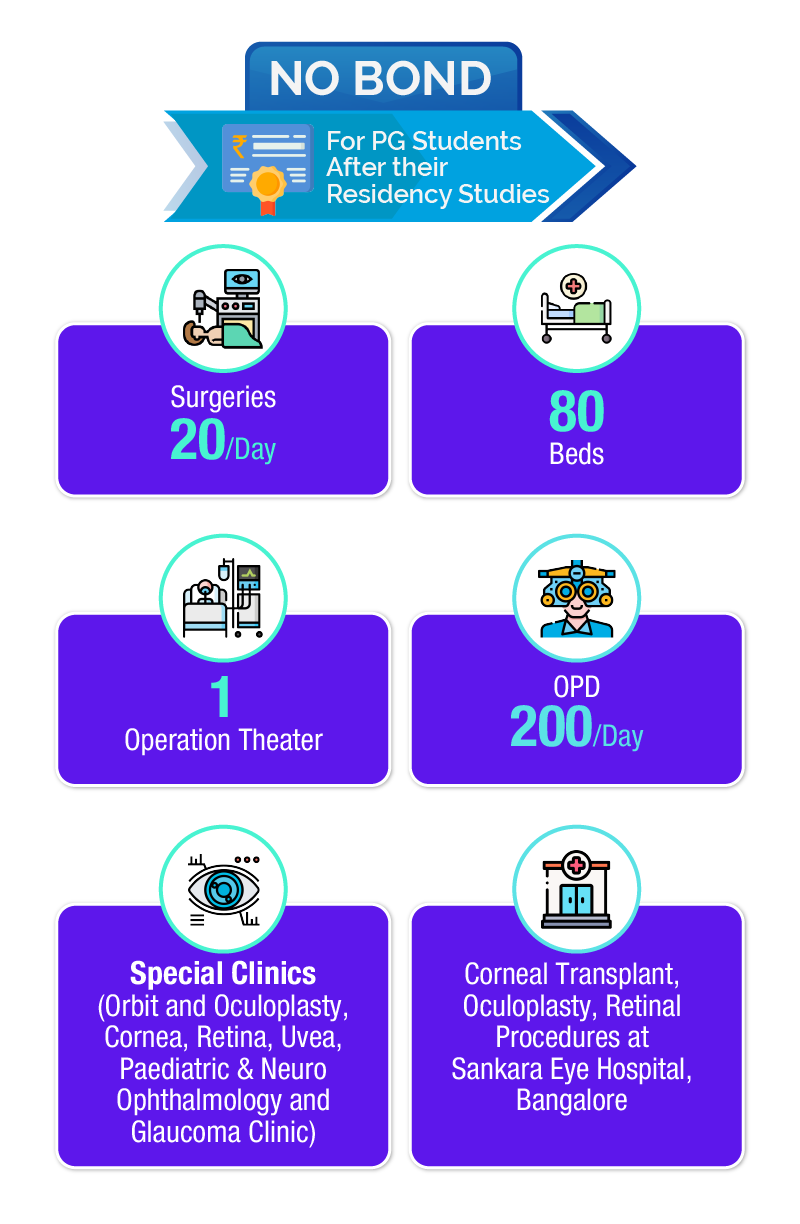
Goal
The purpose of this program is to create competent ophthalmic surgeons with appropriate expertise.
Objectives
This program is designed such that a postgraduate student should possess the
following qualities, knowledge and skills:
-
The student should possess basic knowledge of the structure, function and development of the human body as related to ophthalmology, of the factors which may disturb these mechanisms and the disorders of structure and function which may result thereafter.
-
The student should be able to practice and handle most day-to-day problems independently in ophthalmology. The student should recognize the limitations of his/her own clinical knowledge and know when to seek further help.
-
The student should understand the effects of the environment on health and be familiar with the epidemiology of at least the more common diseases in the field of ophthalmology.
-
The student should be able to integrate the preventive methods with the curative and rehabilitative measures in the comprehensive management of the disease.
-
The student should be familiar with common eye problems occurring in rural areas and be able to deal with them effectively.
-
The student should also be made aware of Mobile Ophthalmic Unit and its working and components.
-
The student should be familiar with the current developments in Ophthalmic Sciences.
-
The student should be able to plan educational programs in Ophthalmology in association with senior colleagues and be familiar with the modern methods of teaching and evaluation.
-
The student should be able to identify a problem for research, plan a rational approach to its solution, execute it and critically evaluate his/her data in the light of existing knowledge.
-
Contribute as an individual/group towards the fulfillment of national objectives with regard to the prevention of blindness.
-
Effectively communicate with patients or relatives so as to educate them sufficiently and give them the full benefit of informed consent to treatment and ensure compliance.
The student should have basic knowledge of medico-legal aspects of medicine and be familiar with patient counseling and proper consent taking.
Click here for M.S Ophthalmology Syllabus & Regulations
-
All candidates seeking admission to Post Graduate Medical & Surgical Degree courses in Chettinad Hospital and Research Institute under Chettinad Academy of Research and Education for the current academic year will have to qualify in the National Eligibility cum Entrance Test for Postgraduates, (NEET-PG) for the respective year conducted by the National Board of Examinations which is mandatory. It shall be necessary for the candidate to obtain minimum of marks at 50th percentile in ‘NEET-PG’. (However, in respect of candidates belonging to Scheduled Castes, Scheduled Tribes and other Backward Classes the minimum marks shall be at 40th percentile. The minimum qualifying mark in case of candidates with loco motor disability of lower limbs shall be at 45th percentile.)
-
As Chettinad Hospital and Research Institute is a constituent college under Chettinad Academy of Research and Education, a Deemed to be University under Section 3 of the UGC Act 1956, admissions are made on All India basis and therefore candidates belonging to any State/Union Territory of India are eligible to apply for admission. There is no restriction based on domicile.
-
The candidates must have satisfactorily completed one-year compulsory rotatory residential internship (CRRI) on or before 31st March the previous year. Candidates who have completed their internship after 31st March of the previous year shall be ineligible to participate at any stage of the admission process.
-
The candidate must have studied and completed the MBBS degree course from a recognized Medical College included in the schedules to the Indian Medical Council Act 1956, and should have obtained permanent Registration Certificate with the Medical Council of India or any of the State Medical Councils.
-
In case of a foreign national, the Medical Council of India may, on payment of the prescribed fee for registration, grant temporary registration, for the duration of the post graduate course limited to the medical college/institution to which the candidate is admitted for the time being exclusively for pursuing post graduate studies.
-
Provided further the temporary registration to such foreign national shall be subject to the condition that such person is duly registered with appropriate registering authority in his own country where from he has obtained his basic medical qualification and is duly recognized by the corresponding Medical Council or concerned authority.
M.S. (Master of Surgery) in General Surgery is a postgraduate course that trains the students to develop the knowledge and skills required for surgical practice. The course equips the students to diagnose and treat common surgical ailments occurring in the community.
The course duration is 3 years.
Candidates after successful completion of MS General Surgery can get recruited as teaching faculty in government and private medical colleges. They can also join hospitals or clinics as consultants. They can opt for private practice or proceed for higher studies comprising of either MCh courses or fellowships. Those candidates inclined to research can join PhD in research institutes.
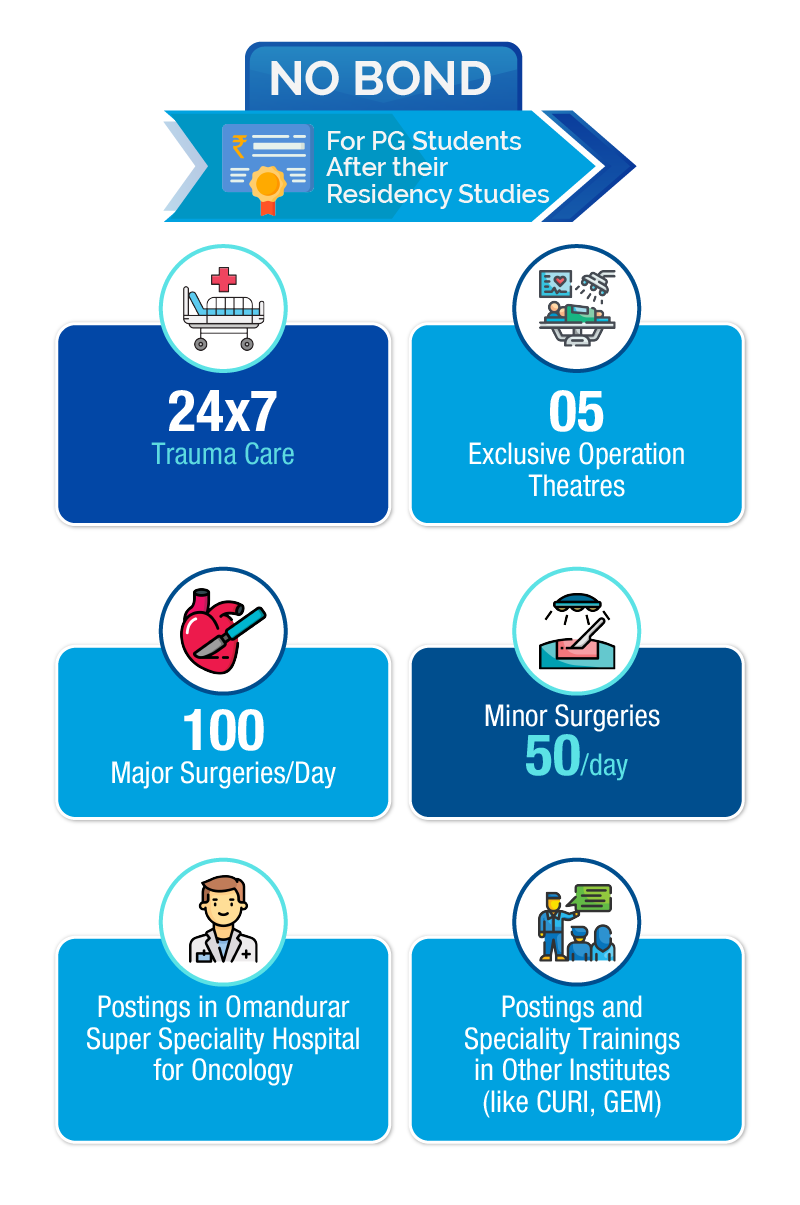
Goal
The purpose of this MS General Surgery program is to create competent general surgeons with appropriate expertise.
Objectives
At the end of postgraduate training, the PG student should be able to:
-
Diagnose and appropriately manage common surgical ailments in a given situation.
-
Provide adequate preoperative, post-operative and follow-up care of surgical
-
Identify situations calling for urgent or early surgical intervention and refer at the optimum time to the appropriate centers.
-
Counsel and guide patients and relatives regarding the need, implications and problems of surgery in the individual patient.
-
Provide and coordinate emergency resuscitative measures in acute surgical situations including trauma.
-
Organize and conduct relief measures in situations of mass disaster including triage.
-
Effectively participate in the National Health Programs especially in the Family
Welfare Programs.
-
Discharge effectively medico-legal and ethical responsibilities and practice his specialty ethically and minimize medical errors.
-
Update knowledge in recent advances and newer techniques inpatient management.
-
Must learn the importance of obtaining informed consent prior to the performance of the operative procedure.
-
Perform a surgical audits on a regular basis and maintain records (manual and/or electronic) for life.
-
Participate regularly in departmental academic activities
-
Demonstrate sufficient understanding of basic sciences related to his specialty.
-
Plan and advise measures for the prevention and rehabilitation of patients belonging to his specialty.
-
Know the basic concepts of research methodology, biostatistics and plan a research project and know how to consult the library.
-
The student should learn the basic methodology of teaching and develop competence in teaching medical/paramedical students.
-
The student will show integrity, accountability, respect, compassion and dedicated patient care. The student will demonstrate a commitment to excellence and continuous professional development and ethical principles relating to providing patient care, the confidentiality of patient information and informed consent.
The student should show sensitivity and responsiveness to patients’ culture, age, gender and disabilities.
Click here for M.S. General Surgery Syllabus & Regulations
-
All candidates seeking admission to Post Graduate Medical & Surgical Degree courses in Chettinad Hospital and Research Institute under Chettinad Academy of Research and Education for the current academic year will have to qualify in the National Eligibility cum Entrance Test for Postgraduates, (NEET-PG) for the respective year conducted by the National Board of Examinations which is mandatory. It shall be necessary for the candidate to obtain minimum of marks at 50th percentile in ‘NEET-PG’. (However, in respect of candidates belonging to Scheduled Castes, Scheduled Tribes and other Backward Classes the minimum marks shall be at 40th percentile. The minimum qualifying mark in case of candidates with loco motor disability of lower limbs shall be at 45th percentile.)
-
As Chettinad Hospital and Research Institute is a constituent college under Chettinad Academy of Research and Education, a Deemed to be University under Section 3 of the UGC Act 1956, admissions are made on All India basis and therefore candidates belonging to any State/Union Territory of India are eligible to apply for admission. There is no restriction based on domicile.
-
The candidates must have satisfactorily completed one-year compulsory rotatory residential internship (CRRI) on or before 31st March the previous year. Candidates who have completed their internship after 31st March of the previous year shall be ineligible to participate at any stage of the admission process.
-
The candidate must have studied and completed the MBBS degree course from a recognized Medical College included in the schedules to the Indian Medical Council Act 1956, and should have obtained permanent Registration Certificate with the Medical Council of India or any of the State Medical Councils.
-
In case of a foreign national, the Medical Council of India may, on payment of the prescribed fee for registration, grant temporary registration, for the duration of the post graduate course limited to the medical college/institution to which the candidate is admitted for the time being exclusively for pursuing post graduate studies.
-
Provided further the temporary registration to such foreign national shall be subject to the condition that such person is duly registered with appropriate registering authority in his own country where from he has obtained his basic medical qualification and is duly recognized by the corresponding Medical Council or concerned authority.
MS (Master of Science) in Obstetrics and Gynaecology (OBG or OB Gyn) is a postgraduate course in dual fields and at the end of the course, the student acquires the skill to take care of the health of the female reproductive system & treat diseases of the same. They acquire the skill set required to manage pregnancy and its complications.
The course duration is 3 years.
Candidates after successful completion of MS OBG course can get recruited as teaching faculty in government and private medical colleges. They can also join hospitals or clinics as consultants. They can opt for private practice or proceed for higher studies comprising of MCh (Urology) and fellowships. They can also specialize in IVF and become infertility consultants. Those candidates inclined to research can join PhD in research institutes.
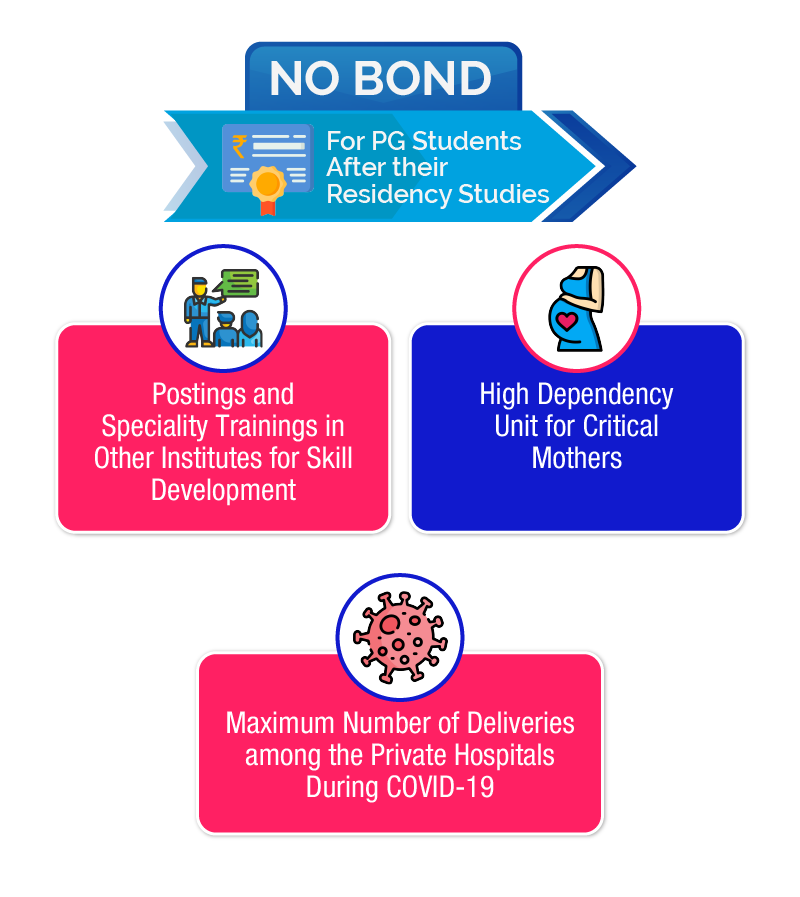
Goals
The purpose of this MS Obstetrics and Gynecology program is to create a competent obstetrician and gynecologist with appropriate skills and expertise.
Objectives
To train the candidate so that they can:
- Provide quality care to the community in the diagnosis and management of
Antenatal, Intra-natal and Post-natal period of normal and abnormal pregnancy and labor, provide effective and adequate care to a pregnant woman with complicated pregnancy.
- Provide effective and adequate care to a normal and high-risk neonate.
- Perform obstetrical ultrasound in normal and abnormal pregnancy including
Doppler.
-
Manage effectively all obstetrical and gynecological emergencies and if necessary, make appropriate referrals.
-
Provide quality care to the community in the diagnosis and management of gynaecological problems including screening, and management of all gynecological cancers including during pregnancy.
-
Conduct a comprehensive evaluation of infertile couple and have a broad-based knowledge of assisted reproductive techniques including – ovulation induction, in vitro fertilization and intra-cytoplasmic sperm injection, gamete donation, surrogacy and the legal and ethical implications of these procedures.
-
Provide counseling and delivery of fertility regulation methods including reversible and irreversible contraception, emergency contraception etc.
-
provide quality care to women having a spontaneous abortion or requesting Medical Termination of Pregnancy (MTP) and manage their related complications.
Click here for M.S. Obstetrics and Gynecology Syllabus & Regulations
-
All candidates seeking admission to Post Graduate Medical & Surgical Degree courses in Chettinad Hospital and Research Institute under Chettinad Academy of Research and Education for the current academic year will have to qualify in the National Eligibility cum Entrance Test for Postgraduates, (NEET-PG) for the respective year conducted by the National Board of Examinations which is mandatory. It shall be necessary for the candidate to obtain minimum of marks at 50th percentile in ‘NEET-PG’. (However, in respect of candidates belonging to Scheduled Castes, Scheduled Tribes and other Backward Classes the minimum marks shall be at 40th percentile. The minimum qualifying mark in case of candidates with loco motor disability of lower limbs shall be at 45th percentile.)
-
As Chettinad Hospital and Research Institute is a constituent college under Chettinad Academy of Research and Education, a Deemed to be University under Section 3 of the UGC Act 1956, admissions are made on All India basis and therefore candidates belonging to any State/Union Territory of India are eligible to apply for admission. There is no restriction based on domicile.
-
The candidates must have satisfactorily completed one-year compulsory rotatory residential internship (CRRI) on or before 31st March the previous year. Candidates who have completed their internship after 31st March of the previous year shall be ineligible to participate at any stage of the admission process.
-
The candidate must have studied and completed the MBBS degree course from a recognized Medical College included in the schedules to the Indian Medical Council Act 1956, and should have obtained permanent Registration Certificate with the Medical Council of India or any of the State Medical Councils.
-
In case of a foreign national, the Medical Council of India may, on payment of the prescribed fee for registration, grant temporary registration, for the duration of the post graduate course limited to the medical college/institution to which the candidate is admitted for the time being exclusively for pursuing post graduate studies.
-
Provided further the temporary registration to such foreign national shall be subject to the condition that such person is duly registered with appropriate registering authority in his own country where from he has obtained his basic medical qualification and is duly recognized by the corresponding Medical Council or concerned authority.
DM (Doctorate of Medicine) in Cardiology is a super – specialty Post MD course which is offered through the faculty of medicine. Specialization in Cardiology involves the diagnosis and treatment of disorders of cardiac rhythm, valvular heart disease, cardiac failure, coronary artery disease and congenital heart diseases. The students enrolled for this program gain a holistic knowledge of the subject through a fusion of the practical and academical model of teaching.
The course duration is 3 years
As the number of patients with cardiac ailments is on the rise, there are myriad opportunities for the cardiologists, both in the government and private sector. Candidates after successfully qualifying in the final exams can work as consultants in cardiology departments or teaching faculty in government and private colleges. They can also involve in research.
Goals
The goal of DM Cardiology program is to provide specialized training in Cardiology to produce competent super specialists capable of providing healthcare to cardiac patients both in the community and in the healthcare centers
Objectives
At the end of the DM course in Cardiology, the student should be able to:
-
Recognize the key importance of medical problems in the context in the health priority of the country;
-
Practice the specialty of cardiology in keeping with the principles of professional ethics.
-
Identify social, economic, environmental, biological and emotional determinants of adult cardiovascular diseases and know the therapeutic rehabilitative, preventive and promotion measures to provide holistic care to all patients.
-
Take detailed history, perform full physical examination and make a clinical diagnosis.
-
Perform and interpret relevant investigations (Imaging and Laboratory).
- Perform and interpret important diagnostic procedures.
-
Diagnose cardiovascular illnesses based on the analysis of history, physical examination and investigative work up;
-
Plan and deliver comprehensive treatment for illness using principles of rational drug therapy.
- Plan and advice measures for the prevention of cardiovascular diseases.
- Plan rehabilitation of adults suffering from chronic illness, and those with special needs;
-
Manage cardiological emergencies efficiently; Demonstrate skills in documentation of case details, and of morbidity and mortality data relevant to the assigned situation;
-
Demonstrate empathy and humane approach towards patients and their families and respect their sensibilities;
-
Demonstrate communication skills of a high order in explaining management and prognosis, providing counseling and giving health education messages to patients, families and communities. Develop skills as a self- directed learner, recognize continuing educational needs; use appropriate learning resources, and critically analyze published literature in order to practice evidence-based medicine
-
Demonstrate competence in basic concepts of research methodology and epidemiology Facilitate learning on MD residents, medical/nursing students, practicing physicians, paramedical health workers and other providers as a teacher- trainer;
-
Play an assigned role in the implementation of national health programs, effectively and responsibly
- Organize and supervise the desired managerial and leadership skills
-
Function as a productive member of a team engaged in health care, research and education.
The Department of Cardiology at Chettinad is equipped with state-of-the-art facilities that place it on par with the top hospitals all across the globe. The D.M. Cardiology program commenced in the year 2013 and offers 2 seats. The syllabus encompasses all the nuances of cardiac care including the latest developments in the field of cardiology.
Letter of permission / Recognition details:
The Course was started based on the Letter of Permission (LOP) issued by the Ministry of Health and Family welfare. The LOP and the recognition of the courses can be viewed at this link.
Click here for D.M. (Cardiology) Syllabus & Regulations
-
A candidate must possess a degree in MD/MS or DNB from a University recognized by the MCI in the respective discipline.
-
All candidates seeking admission to Medical and Surgical super-specialty courses in Chettinad Hospital and Research Institute under Chettinad Academy of Research and Education for the academic year shall have to qualify in the National Eligibility -cum -Entrance Test – SS, (NEET-SS) for the respective year conducted by the National Board of Examinations, New Delhi.
-
Candidates should have obtained the minimum prescribed marks in the qualifying examination as per the Medical Council of India norms.
-
Admissions will be made on the basis of valid rank obtained in the National Eligibility-cum-Entrance Test – Super Specialty (NEET-SS) and based on the admission letters issued by the competent authorities (such as DGHS)
DM (Doctorate of Medicine) in Neurology is a super – specialty Post MD course which is offered through the faculty of medicine. Specialization in Neurology involves the diagnosis and medical management of disorders of the brain, spinal cord and other neurological disorders. The students enrolled for this program gain a holistic knowledge of the subject through a fusion of the practical and academical model of teaching
The course duration is 3 years
There are myriad opportunities for neurologists, both in the government and private sector. Candidates after successfully qualifying in the final exams can work as consultant neurologists or get appointed as teaching faculty in government and private colleges. They can also involve in research.
Goal
The goal of the DM Neurology program is to impart thorough and comprehensive training to the candidate in the various aspects of Neurology, to produce competent super specialists capable of providing healthcare to cardiac patients both in the community and in the healthcare centers
Objectives
At the end of the DM Neurology course, the candidate is expected to:
-
Acquire a comprehensive knowledge of the basics of Neurology including all allied specialties related to Neurology
-
Possess complete Clinical Diagnostic Skills for the recognition of common Nervous system diseases.
-
Possess complete knowledge of all the commonly used Neurophysiological diagnostic Tests like Electroencephalography, Electroneurography, Electromyography, Cerebral evoked potentials
-
Acquire skills in the performance and interpretation of special investigations such as Polysomnography, Video EEG monitoring, EEG-Telemetry, autonomic function tests, Transcranial Doppler tests
-
Acquire skills in interpretation of common neuroimaging investigations such as CT scan, MRI scan, MR and Digital subtraction angiography, Myelography, MR spectroscopy and Single Photon Emission Computerized Tomography.
-
Acquire skills in invasive procedures such as lumbar puncture, intrathecal drug administration, CSF manometry; assisting in digital subtraction angiography and intraarterial thrombolysis; and Nerve and muscle biopsy and their interpretation of relevant histopathology
-
Acquire exposure in sophisticated neuromodulation procedures such as planning of deep brain stimulation, vagal nerve stimulation.
-
Able to apply sound clinical judgement and rational cost-effective investigations for the diagnosis and management of Neurology Cases in the OPD, Wards, Emergency Room and Intensive Care unit.
-
Possess some understanding of the recent advances in the subject of Neurology
-
Be able to teach undergraduate students MBBS and Post Graduate Students
-
Have the ability to organize specific teaching and training programs for paramedical staff, associated professionals and patient education programs. Should be able to develop good communication skills and give consultations to all other departments of the hospital
The Department of Neurology at Chettinad is equipped with the state-of-the-art facilities that place it on par with the best hospitals in the world. The D.M. Neurology program commenced in the year 2013 and offers 1 seat.
Letter of permission / Recognition details
The Course was started based on the Letter of Permission (LOP) issued by the Ministry of Health and Family welfare. The LOP and the recognition of the courses can be viewed at this link.
Click here for D.M. (Neurology) Syllabus & Regulations
-
A candidate must possess a degree in MD/MS or DNB from a University recognized by the MCI in the respective discipline.
-
All candidates seeking admission to Medical and Surgical super-specialty courses in Chettinad Hospital and Research Institute under Chettinad Academy of Research and Education for the academic year shall have to qualify in the National Eligibility -cum -Entrance Test – SS, (NEET-SS) for the respective year conducted by the National Board of Examinations, New Delhi.
-
Candidates should have obtained the minimum prescribed marks in the qualifying examination as per the Medical Council of India norms.
-
Admissions will be made on the basis of valid rank obtained in the National Eligibility-cum-Entrance Test – Super Specialty (NEET-SS) and based on the admission letters issued by the competent authorities (such as DGHS)
DM (Doctorate of Medicine) in Neonatology is a super – specialty Post MD course which is offered through the faculty of medicine. Specialization in this branch of Pediatrics trains the students to provide the appropriate medical care of newborn infants, especially those born premature or ill. The students enrolled for this program gain a holistic knowledge of the subject through a fusion of the practical and academical model of teaching
The course duration is 3 years.
Candidates after successfully qualifying in the final exams can work as consultants in pediatric departments or neonatal intensive care units or teaching faculty in government and private colleges. They can also involve in research.
</p<
Goal
The goal of the DM program is to provide advanced training in Neonatology to produce competent super-specialists who are able to provide clinical care of the highest order to the newborn infants and serve as future teachers, trainers, researchers and leaders in the field of Neonatology.
Objectives
After completing the DM (Neonatology) course the student will be able to:
-
Analyze neonatal health problems scientifically, taking into account the biological basis as well as the socio-behavioral epidemiology of the perinatal neonatal disease, and advise and implement strategies aimed at the prevention of neonatal morbidity and mortality.
-
Provide primary, secondary and tertiary care to all newborn infants including intensive care of the highest standard to the critically sick and the very low birth weight neonates using advanced therapeutic and supportive modalities and skills.
-
Implement a comprehensive follow up and early intervention program for the ‘at risk’ newborn infants, and plan, counsel and advise rehabilitation of the neurodevelopmentally challenged infants. Take rational decisions in the face of ethical dilemmas in neonatal practice.
-
Exhibit communication skills of a high order and demonstrate compassionate attributes befitting a caring neonatologist.
-
Plan and carry out research in neonatal health in clinical, community and laboratory settings. Teach newborn care to the medical and the nursing students as well as grassroots health functionaries, and develop earning resource materials for them.
-
Plan, establish and manage level II and level III neonatal units independently.
-
Use and maintain the essential neonatal equipment and keep abreast with advances in newborn care technology.
-
Organize newborn care in the community and at the secondary level of the health system, and play the assigned role in the national programs aimed at the health of mothers and their infants.
-
Seek and analyze new literature and information on neonatology, update the concepts, and practice evidence-based neonatology
The Department of Neonatology at Chettinad is equipped with the state-of-the-art facilities that place it on par with the best hospitals in the world. The D.M. Neonatology program commenced in the year 2013 and offers 1 seat.
Letter of permission / Recognition details:
The Course was started based on the Letter of Permission (LOP) issued by the Ministry of Health and Family welfare. The LOP and the recognition of the courses can be viewed at this link.
Click here for D.M. (Neonatology) Syllabus & Regulations
-
A candidate must possess a degree in MD/MS or DNB from a University recognized by the MCI in the respective discipline.
-
All candidates seeking admission to Medical and Surgical super-specialty courses in Chettinad Hospital and Research Institute under Chettinad Academy of Research and Education for the academic year shall have to qualify in the National Eligibility -cum -Entrance Test – SS, (NEET-SS) for the respective year conducted by the National Board of Examinations, New Delhi.
-
Candidates should have obtained the minimum prescribed marks in the qualifying examination as per the Medical Council of India norms.
-
Admissions will be made on the basis of valid rank obtained in the National Eligibility-cum-Entrance Test – Super Specialty (NEET-SS) and based on the admission letters issued by the competent authorities (such as DGHS)
M.Ch.(Master of Chirurgiae) in Cardio Vascular and thoracic Surgery is a super specialization course for qualified surgeons who wish to enhance their knowledge and skills in treatment of diseases of the thorax, including heart and lungs. They gain the skills and expertise in surgical procedures such as thoracic organ transplantation and surgical treatment of valvular, aneurysm, congenital, and ischemic heart disease, pulmonary and mediastinal tumors.
The course duration is 3 years.
After successful completion of the MCh course, the surgeons can practice as consultant surgeons in their speciality or work as teaching faculty in government and private medical colleges. They can also enroll for PhD program.
Goal
The overall goal of the training program is to produce a specialist who can serve as a tertiary care physician capable of carrying out effective treatment for cardiac, vascular and thoracic surgical problems. The M.Ch. course in Cardio-Vascular and Thoracic surgery will aim at inculcating a rational approach in treatment of patients by imparting sound knowledge of the subject and by teaching surgical skills to the post-graduate student.
Objectives:
At the end of the MCh course in Cardio Vascular and Thoracic Surgery, the student should be able to:
-
Recognize the key importance of medical problems in the context of the health priority of the country.
- Practice the specialty of CVTS in keeping with the principles of professional ethics
-
Identify social, economic, environmental, biological and emotional determinants of adult Cardiothoracic disorders and know the therapeutic, rehabilitative, preventive and promotion measures to provide holistic care to all patients
-
Take detailed history, perform full physical examination and make a clinical diagnosis; Perform and interpret relevant investigations (Imaging and Laboratory)
- Perform and interpret important diagnostic procedures
-
Diagnose illnesses in adults based on the analysis of history, physical examination and investigative work up
-
Plan and deliver comprehensive treatment for illness in adults using principles of rational drug therapy; Plan and advise measures for the prevention of diseases
- Plan rehabilitation of adults suffering from chronic illness, and those with special needs
-
Manage emergencies efficiently; Demonstrate skills in documentation of case details, and of morbidity and mortality data relevant to the assigned situation.
- Demonstrate empathy and humane approach towards patients and their families and respect their sensibilities.
- Demonstrate communication skills of a high order in explaining management
- prognosis, providing counselling and giving health education messages to patient families and communities.
-
Develop skills as a self-directed learner, recognize continuing educational needs use appropriate learning resources, and critically analyse relevant published literature in order to practice evidence-based medicine.
- Demonstrate competence in basic concepts of research methodology and epidemiology;
-
Facilitate learning of medical/nursing students, practicing physicians, para-medical health workers and other providers as a teacher-trainer.
-
Play the assigned role in the implementation of national health programs, effectively and responsibly.
- Organize and supervise the desired managerial and leadership skills
Function as a productive member of a team engaged in health care, research and education.
-
A candidate must possess a degree in MD/MS or DNB from a University recognized by the MCI in the respective discipline.
-
All candidates seeking admission to Medical and Surgical super-specialty courses in Chettinad Hospital and Research Institute under Chettinad Academy of Research and Education for the academic year shall have to qualify in the National Eligibility -cum -Entrance Test – SS, (NEET-SS) for the respective year conducted by the National Board of Examinations, New Delhi.
-
Candidates should have obtained the minimum prescribed marks in the qualifying examination as per the Medical Council of India norms.
Admissions will be made on the basis of valid rank obtained in the National Eligibility-cum-Entrance Test – Super Specialty (NEET-SS) and based on the admission letters issued by the competent authorities (such as DGHS)
M.Ch.(Master of Chirurgiae) in Neurosurgery is a super specialization course for qualified surgeons who wish to specialize further and enhance their knowledge and skills in the surgical and non-surgical treatment of disorders of the brain and spinal cord. They specialize in one of the most complex and fascinating areas of medicine, involving the brain, spinal cord and other components of the nervous system. The students enrolled for this program gain a holistic knowledge of the subject through a fusion of the practical and academical model of teaching
The course duration is 3 years.
After successful completion of the MCh course, the surgeons can practice as consultant in their speciality or work as teaching faculty in government and private medical colleges. They can practice in the field of general neurosurgery or can specialize in any of the subspecialties of neurosurgery. They can also enroll for PhD program or can conduct research, clinical trials.
Goal
The goal of the M.Ch. (Neuro Surgery) course is to produce competent neurosurgeons with the adequate knowledge and skills in the management of diseases of the brain, spinal cord and nervous system, while upholding the ethics of the medical profession.
Objectives
- Practice the specialty of neuro surgery in keeping with the principles of professional ethics
-
Know the therapeutic, rehabilitative, preventive and promotion measures to provide holistic care to all patients
- Take detailed history, perform full physical examination and make a clinical diagnosis;
- Perform and interpret relevant investigations (Imaging and Laboratory)
- Perform and interpret important diagnostic procedures
- Diagnose illnesses in adults based on the analysis of history, physical examination and investigative work up
- Plan and deliver comprehensive treatment for illness in adults using principles of rational drug therapy;
- Plan and advise measures for the prevention of diseases;
- Plan rehabilitation of adults suffering from chronic illness, and those with special needs; Manage emergencies efficiently
-
Demonstrate skills in documentation of case details and of morbidity and mortality data relevant to the assigned situation; Demonstrate empathy and humane approach towards patients and their families and respect their sensibilities;
-
Demonstrate communication skills of a high order in explaining management and prognosis, providing counselling and giving health education messages to patients, families and communities.
-
Develop skills as a self-directed learner, recognize continuing educational needs; use appropriate learning resources, and critically analyze relevant published literature in order to practice evidence-based medicine
-
Demonstrate competence in basic concepts of research methodology and epidemiology
-
Facilitate learning of medical/nursing students, practicing surgeons, para-medical health workers and other providers as a teacher-trainer;
-
Play the assigned role in the implementation of national health programs effectively and responsibly.
- Organize and supervise the desired managerial and leadership skills;
-
Function as a productive member of a team engaged in health care, research and education.
The Department of Neurosurgery at Chettinad is equipped with the state-of-the-art facilities that place it on par with the best hospitals in the world. M.Ch. Neurosurgery program commenced in the year 2013 and offers 1 seat.
Letter of permission / Recognition details:
The Course was started based on the Letter of Permission (LOP) issued by the Ministry of Health and Family welfare. The LOP and the recognition of the courses can be viewed at link.
Click here for M.Ch. (Neuro Surgery) Syllabus & Regulations
-
A candidate must possess a degree in MD/MS or DNB from a University recognized by the MCI in the respective discipline.
-
All candidates seeking admission to Medical and Surgical super specialty courses in Chettinad Hospital and Research Institute under Chettinad Academy of Research and Education for the academic year shall have to qualify in the National Eligibility -cum -Entrance Test – SS, (NEET-SS) for the respective year conducted by the National Board of Examinations, New Delhi.
-
Candidates should have obtained the minimum prescribed marks in the qualifying examination as per the Medical Council of India norms.
Admissions will be made on the basis of valid rank obtained in the National Eligibility-cum-Entrance Test – Super Specialty (NEET-SS) and based on the admission letters issued by the competent authorities (such as DGHS)
M.Ch.(Master of Chirurgiae) in Urology is a super specialization course for qualified surgeons who wish to enhance their knowledge and skills in the surgical and non-surgical treatment of diseases of the genitourinary tract, including the kidney, urinary bladder, adrenal glands and urinary problems. This course also equips them to deal with disorders concerning male sexual and reproductive health. The post graduate students gain competence in surgical procedures for the treatment of cancers, incontinence, infertility and in renal transplantation.
The course duration is 3 years
After successful completion of the MCh course, the surgeons can practice as consultant surgeons in their speciality or work as teaching faculty in government and private medical colleges. They can also enroll for PhD program.
Goal
The Goal of M.Ch (Urology) degree course is to produce highly competent medical manpower in Urology. The training ingredients should provide in-depth knowledge of the entire urology and relevant basic allied subjects. The course is expected to bring about a change in attitude towards a better scientific approach with logic and analysis. More stress should be given to the development of psychomotor skills. This should culminate in the shaping of a shrewd clinician, confident surgeon and a knowledgeable teacher insured to basic research methodology. Basis of an ideal training program will be a powerful urology service complete in every sense. Today, a urology-teaching department should include complete adult and paediatric urology services with fully developed subspecialties such as gynaecological urology, uro oncology, neuro-urology, Andrology, paediatric urology, Urodynamics, & sexual dysfunction, newer modalities of stone management like endourological techniques and extracorporeal shock wave lithotripsy and renal transplantation. However, it has to be kept in mind is urologist has to be perfect in Endo- urological techniques,
Objectives
-
Postgraduate medical education in M.Ch. urology shall be to produce a competent expert in the field of urology and a medical teacher in urology
-
He/she shall recognize the health needs of community and carry out professional obligations ethically and keeping in mind the objectives of national health policy
-
He/she shall have mastered most the competencies pertaining to urology that are required in clinical practice and for tertiary level healthcare delivery system
-
He/she shall be aware of contemporary advances and development in the field of urology.
-
He/she shall have acquired a spate of scientific inquiry and is oriented to the principles of research methodology and epidemiology
-
He/she shall have acquired the basic skills in teaching to medical graduates and surgical post
-
He/she should be competent enough to offer super specialties services in the area of urology to other sister specialties like gynaecology, oncology, nephrology, transplantation etc.
The Department of Urology at Chettinad is equipped with the state-of-the-art facilities that place it on par with the best hospitals in the world. The M.Ch. Urology program was commenced in the year 2013 and offers 1 seat.
Letter of permission / Recognition details:
The Course was started based on the Letter of Permission (LOP) issued by the Ministry of Health and Family welfare. The LOP and the recognition of the courses can be viewed at the link.
Click here for M.Ch. (Urology) Syllabus & Regulations
-
A candidate must possess a degree in MD/MS or DNB from a University recognized by the MCI in the respective discipline.
-
All candidates seeking admission to Medical and Surgical super-specialty courses in Chettinad Hospital and Research Institute under Chettinad Academy of Research and Education for the academic year shall have to qualify in the National Eligibility -cum -Entrance Test – SS, (NEET-SS) for the respective year conducted by the National Board of Examinations, New Delhi.
-
Candidates should have obtained the minimum prescribed marks in the qualifying examination as per the Medical Council of India norms.
Admissions will be made on the basis of valid rank obtained in the National Eligibility-cum-Entrance Test – Super Specialty (NEET-SS) and based on the admission letters issued by the competent authorities (such as DGHS)
DM (Doctorate of Medicine) in Gastroenterology is a super – specialty Post MD course which is offered through the faculty of medicine. Specialization in Gastroenterology deals with medication, treatment, and rehabilitation of human digestive system related ailments. The students enrolled for this program gain a holistic knowledge of the subject through a fusion of the practical and academical model of teaching.
The course duration is 3 years
Candidates after successfully qualifying in the final exams can work as consultants in cardiology departments or teaching faculty in government and private colleges. They can also involve in research.
Goals
The goal of the DM Gastroenterology program is to impart thorough and comprehensive training to the candidate in the various aspects of Neurology, to produce competent super specialists capable of providing healthcare to cardiac patients both in the community and in the healthcare centers
Objectives
At the end of the DM course in Gastroenterology, the student should be able to:
-
Recognize the key importance of medical problems in the context of the health priority of the country. Practice the specialty of gastroenterology in keeping with the principles of professional ethics.
-
Identify social, economic, environmental, biological and emotional determinants of adult gastroenterology diseases and know the therapeutic, rehabilitative, preventive and promotion measures to provide holistic care to all patients.
-
Take a detailed history, perform a full physical examination and make a clinical diagnosis
-
Perform and interpret relevant investigation (Imaging and Laboratory)
-
Perform and interpret important diagnostic procedures,
-
Diagnose gastroenterological illnesses in adults based on the analysis of history, physical examination and investigative work up
-
Plan and deliver comprehensive treatment for illness in adults using principles of rational drug therapy.
-
Plan and advise measures for the prevention of gastroenterological diseases
-
Plan rehabilitation of adults suffering from chronic illness, and those with special needs.
-
Manage gastroenterological emergencies efficiently
-
Demonstrate skills in the documentation of case details and of morbidity and mortality data relevant to the assigned situation
-
Demonstrate empathy and humane approach towards patients and their families and respect their sensibilities
-
Demonstrate communication skills of a high order in explaining management and prognosis, providing counseling and giving health education messages to patients, families and communities.
-
Develop skills as a self-directed learner, recognize continuing educational needs; use appropriate learning resources, and critically analyze relevant published literature in order to practice evidence-based medicine
-
Demonstrate competence in basic concepts of research methodology and epidemiology.
-
Facilitate learning of medical/nursing students, practicing physicians, para-medical health workers and other providers as a teacher-trainer
-
Play the assigned role in the implementation of national health programs, effectively and responsibly
-
Organize and supervise the desired managerial and leadership skills
-
Function as a productive member of a team engaged in health care, research and education.
The Department of Gastroenterology at Chettinad is having state-of-the-art facilities that place it on par with the best hospitals in the world. The D.M. Gastroenterology program commenced in the year 2014 and offers 1 seat.
Letter of permission / Recognition details:
The Course was started based on the Letter of Permission (LOP) issued by the Ministry of Health and Family welfare. The LOP and the recognition of the courses can be viewed at this link.
Click here for D.M. (Medical Gastroenterology) Syllabus & Regulations
-
A candidate must possess a degree in MD/MS or DNB from a University recognized by the MCI in the respective discipline.
-
All candidates seeking admission to Medical and Surgical super-specialty courses in Chettinad Hospital and Research Institute under Chettinad Academy of Research and Education for the academic year shall have to qualify in the National Eligibility -cum -Entrance Test – SS, (NEET-SS) for the respective year conducted by the National Board of Examinations, New Delhi.
-
Candidates should have obtained the minimum prescribed marks in the qualifying examination as per the Medical Council of India norms.
Admissions will be made on the basis of valid rank obtained in the National Eligibility-cum-Entrance Test – Super Specialty (NEET-SS) and based on the admission letters issued by the competent authorities (such as DGHS)



